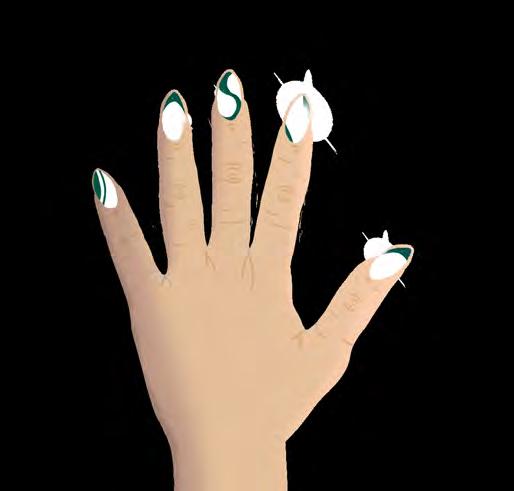The Epitaph
Students in Chinese 3 make lanterns to celebrate Lunar New Year.






Chinese3willbephased out in the 2026-27 school yearduetodeclining enrollment.(Photosby DavidLin)

Students in Chinese 3 make lanterns to celebrate Lunar New Year.






Chinese3willbephased out in the 2026-27 school yearduetodeclining enrollment.(Photosby DavidLin)

In response to declining enrollment, the district plans to discontinue one language option at each FUHSD site, according to an email from FUHSD on April 14.
At HHS, based on district recommendation, Chinese will begin phasing out in the 2024-25 school year. However, at the board meeting on April 28, Board of Trustee Stanley Kou said the plan to discontinue Chinese is not final, and the district is still taking community input.
Discontinued languages will be phased out over the course of four school years, according to the same email. Level 1 courses will be the first to no longer be offered, followed by levels 2 through AP in each subsequent year. All students currently enrolled in language classes will be able to finish their learning paths, including students who start their language paths at feeder middle schools, according to the email.
“We are having declining enrollment, so over the next five years, that would be 2,000 students [lost],” Superintendent Graham Clark said in a phone interview. “We offer four languages at all five schools at five levels. If you multiply it out, that’s 20 different courses per school. In the long run, that’s not sustainable.”
When deciding which language to discontinue at each school site, Clark said the district took into account a variety of factors, including how many students sign up for that particular language, how many sections of that language are offered and which courses are overstaffed. Overstaffed courses
are those that do not meet the required 32:1 student-to-teacher ratio, Clark said.
Teachers whose programs are discontinued will be transferred to a different site, Clark said. Furthermore, Clark said FUHSD’s four language offerings present more options for students than they would have at many other similarly-sized school districts.

Incoming students who hope to pursue a language not offered at their school site may be able to transfer to a different site or earn language credits at community college; however, details for such pathways have not yet been finalized.
“If we had the same amount of students who want to take the same amount of courses, it’d be easy,” Clark said. “People generally love the school that they work at, and the idea of moving to another school is emotionally rough on teachers. We try to avoid it at all costs.”
Chinese teacher Vivian Ju said over the years, Chinese has shared the lowest enrollment with another language program at HHS, meaning Chinese should not be discontinued on the basis of low enrollment. In addition, Ju said the Chinese program has maintained a steady enrollment of around 214 students over the past several years without having issues of overstaffing.
“Numbers speak volumes,” Ju said. “The fact that our numbers have been consistent over the last five years means that we can sustain ourselves. In my opinion, closing a program that is thriving and desired by the community is not the best service to the community.”
Ju, who has been teaching at HHS for around 10 years, said she was shocked when the district told her that the Chinese program would be phased out. While Ju said she acknowledges the difficulty of the district’s decision, she wishes the district had discussed this with teachers beforehand.
Teachers are represented at the district by the Fremont Education Association, which is led by union president Jason Heskett. Heskett said he has been meeting with language teachers to discuss their concerns, then poses those concerns to the district.
“The district can determine that they want to cut a program, and we [teachers] have very little power,” Heskett said. “It specifically says that in the contract. When something like this is announced, it’s [the union’s] job to talk to the teacher — ‘What are our next steps?’ ‘What are our next options?’”
Ju said she is grateful to those advocating for the Chinese program, especially the world language teachers and department lead Muriel Von Stein. Still, Ju said hearing the news has taken an emotional toll on her.
“I have to say I cried, but in front of the students, I had to act normal,” Ju said. “It was a lonely journey. Every day in the classroom, I had to force myself not to break down into tears while looking at all the lovely decorations Ms. Bai and I have put up over the years.”
Heskett said the reality of declining enrollment is difficult for the union because there seems to be few alternative solutions to reducing courses.
Throughout his time working at the district, Board member Roy Rocklin was an inspiration, board clerk Jeff Moe said.
Rocklin passed away on March 19 at 69 years old due to skin cancer, and continued to work even during his last days at the hospital, Moe said.
After pursuing higher education and a career in analytical chemistry, Rocklin taught physics and chemistry at Lynbrook High School for 10 years
before being elected to the Board of Trustees.
Director of leadership development Josh Maisel said he met Rocklin in 2008 when they were both teachers at LHS. Maisel said Rocklin was an engaged member of the community, and unafraid to speak his mind as a board member.
Rocklin was also interested in supporting students’ educational endeavors, and was heavily involved in the district’s AVID program, Maisel said.
See Rocklin tribute, Page 2
“It’s something that puts the association in the worst place, because we really don’t have any negotiating power over this,” Heskett said. “I think our world language
teachers feel a little bit helpless. They’re losing their programs, and it’s emotional for them.”
See Languages, Page 2
Administration enacted a ban on the clothing brand “Cookies” due to the brand’s increasing presence on campus, according to an email sent by dean Maria Trejo on March 28. Students wearing “Cookies” items on campus will receive disciplinary action, principal Greg Giglio said.
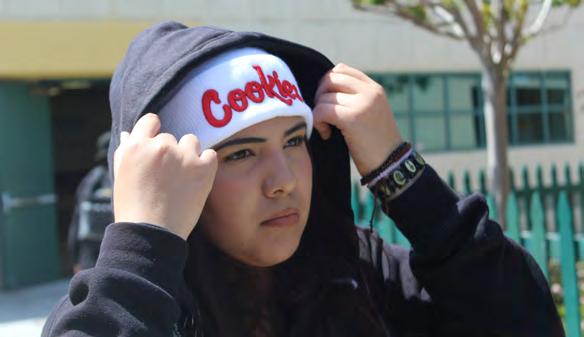
“I think people are pretty aware that [the brand] is directly related to marijuana and marijuana dispensaries, so just like Budweiser or Coors or Marlboro, that kind of
stuff is not allowed,” Giglio said. “We don’t want to allow people to wear stuff that promotes drugs and alcohol.”

In fact, according to the Cookies website, founder Gilbert Milam said he hoped to “create something unique that would help bridge the gap between streetwear, urban lifestyle, marijuana, hip-hop music and a multi-cultural society.”


After issuing multiple warnings to students throughout the semester for wearing the brand, Trejo said increased intervention was necessary.
See ‘CookieS,’ Page 2
Roy Rocklin: ‘We will miss him’
The Starbucks in Buffalo, New York voted to unionize on Dec. 9, 2021, successfully becoming the first unionized Starbucks in the U.S. Since then, more than 300 Starbucks locations across the U.S. have unionized, according to CNBC. Now, the Starbucks at the intersection of Mary and Fremont is joining them after voting 20-0 in favor of unionization, the second largest unanimous unionization vote in the history of the company according to Union Election Data.
Baristas at the Mary and Fremont location filed for a union election on March 14. In a letter addressed to Starbucks CEO Howard Schultz and signed by 21 baristas, workers said they felt undervalued, accusing the company of deliberately understaffing and overworking employees. Employees said they unionized for more consistent scheduling, guaranteed benefits and higher pay.
Senior, Starbucks barista Maayan Pendler, who signed the letter, said she has experienced short staffing, which has caused
her to feel overwhelmed.
“There was one shift where someone called out [sick] and we were understaffed. We had to do extra to cover for that person,” Pendler said. “Whenever we have rushes and we don’t have enough people, the baristas are constantly scrambling and were backed up. It becomes very stressful.”
Barista and union leader Klara Daniaud said she began organizing after seeing coworkers being disrespected by the corporation.
“Starbucks markets themselves as being progressive and caring about our wellbeing and how much we like our work — that’s [how] they portray themselves to the public and to the media. We just haven’t felt that,” Daniaud said. “Starbucks does offer some great benefits for part-time workers, but you need to work over 20 hours a week to qualify for them.
We have no evidence of it, but we felt that they were manipulating our schedule so that some of us no longer qualified for benefits. That was what really made us reach a breaking point.”
Federal judges have ruled that
Starbucks violated federal labor law over 100 times during the past 18 months, according to the U.S. Senate Committee on Health, Education, Labor and Pensions. One judge issued a decision concluding that the corporation had violated U.S. labor laws in “egregious and widespread misconduct demonstrating a general disregard for the employees’ fundamental rights,” according to NLRB. Schultz has since denied any labor violations.
Daniaud, as well as supervisor, HHS alum Nathan Hanner said they have witnessed union-busting techniques, such as increased corporate presence, explicit pressure to vote no on unionization and stricter enforcement of store policies. Daniaud said Fremont and Mary Starbucks employees are currently in the process of filing unfair labor practice lawsuits with the NLRB.
“It’s a law that workers are allowed to wear attire to work that represents their support for a union,” Daniaud said. “In our case, it was our Starbucks Workers United shirts. We got written up and asked to change when we wore them initially, which is illegal. Their tactic very evidently was to deal with the lawsuit later and just get people in trouble now so that we could pile up our disciplinary actions and eventually be terminated so that we weren’t able to vote at the election.”

Barista Dahlia Maldonado said she is happy to have contributed to a campaign that will leave a mark on the labor rights movement.
“Our verbal warnings aren’t hitting home,” Trejo said. “We don’t want to punish students, we want them to be aware that they are in a school, and they need to abide by the rules.”
Under this policy, students wearing the brand on campus will be required to change and will be assigned Saturday school, Trejo said. Because administrators may not always be able to see when students are wearing “Cookies” items, Giglio said that teachers are also responsible for enforcing the ban.
“You might be wearing a sweatshirt with a ‘Cookies’ shirt underneath it and when you get into class, you take it off, so [administrators] don’t see it,” Giglio said. “And teachers may not have been aware of it, so we’ve sent out an email to teachers saying this is marijuana-related. It’s just putting all eyes on [the issue].”
English, drama teacher Leslie Lloyd said as a high school, HHS is reasonable to ban items that display illegal things for minors to do.
“You should not be promoting something you’re not able to partake in,” Lloyd said. “Once you’re 21 you can make your own choices.”
English, drama teacher Leslie Lloyd said brands can have hidden meanings behind them as well, and students must understand what these brands represent when
choosing to wear them.
“You’ve got to understand what you’re presenting and you have to know what’s behind it,” Lloyd said. “Is [weed] what you want to promote to the world? Is that a concept you really believe in? It’s one thing to do it ignorantly, but when you find out you got to take care of it. If you realize what you’re doing and you do it in defiance, I don’t think that’s right.”
While Lloyd said she is in support of the ban, she said teachers should not be tasked with monitoring students’ attire.
“There are several rules that make sense, but who’s going to regulate that?” Lloyd said. “If someone walks in with a “Cookies” shirt, I’m probably not gonna do anything. I just want to teach. I don’t want to have to worry about what [students] are wearing.”
Before the implementation of the ban, sophomore Angelina Solorio said she had received detention for wearing a “Cookies” sweatshirt to school.
Solorio, who had received the sweatshirt from a family member, said she initially thought the brand was harmless.
“I didn’t think anything of it, because to me, it’s just clothing,” Solorio said. “People may judge, but I don’t really care what I wear, it just looked cool.”
EmployeesattheFremontandMarybranchvoted20-0infavorof unionization.(PhotobyJossBroward)
“AVID’s mission is to help students, especially those who will be the first in their family to go to college, and [Rocklin] was really passionate about that mission,” Maisel said. “He spoke highly of AVID and promoted it every chance he got. In the spring, he gave a sizable donation to fund several AVID scholarships for the next four or five years, and he left it without his name attached to it. ”
Maisel said Rocklin’s obituary encouraged readers to donate to AVID in Rocklin’s memory instead of buying flowers. Soon, the program received over $5,000. In addition to supporting the AVID
program, Maisel said Rocklin made the effort to attend every Summer Academy graduation he could.
“It’s important to know how much power we really do have because when you’re having major corporations and politicians publicly defaming the movement, that shows their fear,” Maldonado said. “Sitting back and reflecting on the power that you hold is the biggest thing. Once you can recognize that and sit in that power, they can’t stop you.”
Roy could take complicated things and just lay them out in a clear, logical way so that others could understand it, He was very patient too, and was completely non judgemental.
Jeff Moe Board of Trustee
“Up until this year, I was responsible for the Summer Academy Program,” Maisel said. “When we did presentations for the board about it, [Rocklin] was always keenly interested in how our program was supporting students to get back on track after they’ve stumbled, which is the purpose of our summer programs. He was very supportive of that, and cared about assisting every single student he could.”
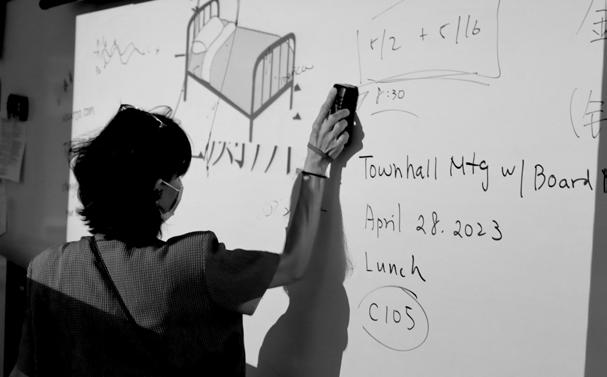
Superintendent Graham Clark worked with Rocklin in volunteer committees together to raise money for the district, and said Rocklin’s thoughtful personality and support for the district will be missed. In particular, Clark said Rocklin was good at informing the community about important issues, such as the need to modernize the buildings.
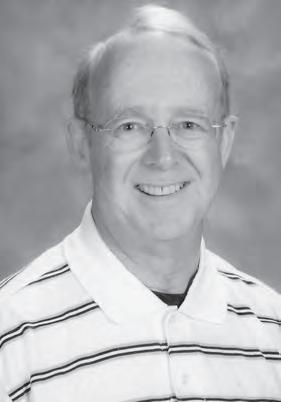
“He was passionate about us being fiscally conservative and making sure we use our money as best as we can for students,”
Clark said. “Before he made a decision, he wanted to hear all the
information, and so he was thorough, detailed and fair. When the district was having a lot of controversy about cell phone towers, he did a lot of research on the health effects of having cell phone towers to make sure everyone was staying accurately informed.”
Similarly, Moe said Rocklin’s methodical way of thinking greatly contributed to the board’s accomplishments over the years.
“Roy could take complicated things and just lay them out in a clear, logical way so that others could understand it,” Moe said. “He was very patient too, and was completely non-judgemental.”
Outside of work matters, Moe said Rocklin was a positive individual to be around.
“He was a strong family guy who really loved his wife and would always talk about how proud he was of his kids,” Moe said. “ I speak on behalf of the whole board when I say that we’re all going to miss him a lot, because he was a good, loyal friend – a friend for life kind of a guy.”
StudentsparticipateintheApril28townhall,manyofferingtheir
For junior Ting-Yong Liu, the news of the discontinuation of Chinese came as a surprise. Liu, who has taken both Chinese 4 honors and AP Chinese, said she felt the program was popular among students and despite common belief, does not entirely consist of Chinese-speaking students.
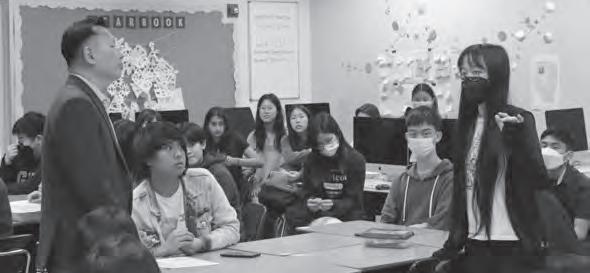
“I feel really connected to the Chinese program and it’s almost unfair because Chinese is one of the most spoken languages worldwide,” Liu said. “It’s unfair to prevent students from learning this important language.”
Chinese teacher Jie Bai said all four languages at HHS are strong programs, and the district should consider each school’s needs individually rather than implementing a ‘one-size-fits-all’ policy. Similarly, Ju said HHS needs four language
programs due to the diversity of the student body.
“We are so diverse,” Ju said. “This is a unique feature of Homestead that we should be proud of. The fact that all the language programs are strong is a reflection of how diverse our campus is. We hope the Chinese program at HHS will stay intact, but if we ever don’t have enough students and have to shrink our program, then we will take it. At least we would have the program here.”
Ju said she loves teaching Chinese at HHS because she loves passing down her heritage. In addition, Bai said she finds her work very meaningful.
“The students here really want to learn the language, not only for the grades,” Bai said. “They want to use it in their life.”
In her 19th year teaching at HHS, art department lead and teacher Clare Dee was announced as teacher of the year (TOTY) on March 29.
When Dee’s name came into discussion, the TOTY committee felt she was a strong candidate because of her experience, compassion toward others and her work with a wide spectrum of students, TOTY committee leader Shawnee Rivera said.
“I really appreciate a teacher who holds students accountable because you know that it comes from a place of real concern and that they really care about you,” Rivera said. “I think that’s more powerful than a teacher who dismisses stuff like that, so I admire that about her.”
The TOTY committee is comprised of past winners who decide the next recipient after a round of votes, Rivera said. After weeks of deliberation, Rivera said they announced the TOTY during a staff barbecue.
Dee said hearing her name announced came as a surprise, especially since she was preoccupied with concerns about an iron she had left on in her classroom.
“I actually fainted a little bit because I hadn’t eaten,” Dee said. “I was just so shocked because I imagine teacher of the year as someone who is organized, doesn’t get frustrated and knows where everything is — that’s just not me, and probably never will be.”
After the announcement, Dee said she was moved by her peers cheering her on.
“I started crying when everyone began clapping,” Dee said. “I felt appreciated for all my work. I was so happy.”
Junior Sarmyshta Vaddi said she was not surprised Dee won the TOTY, as she has been an encouraging teacher to her.
“She has helped me embrace my artistic side by working with me to make my projects a reality,” Vaddi said. “Not every teacher sits down with their students and has conversations with them about how they want to achieve their goals.”
While Dee has many more goals to achieve in her career, she said she hopes her class has inspired students to integrate creativity into their lives.

“I am really honored, and I take it as a big ‘thank you’ to all the work I have done,” Dee said.

When paraeducator Claudia Ortiz was selected as the classified staff member of the year (CSOTY) on March 29, her colleagues in the resource department were not surprised. A warm and welcoming individual, Ortiz brightens the HHS community, lead resource specialist Janice Swearingen said.
Every year, staff members can nominate up to three staff members for CSOTY. The award recipient gains access to a designated parking spot and is recognized at a school board meeting in May. Staff who voted for Ortiz noted her warm presence and strong work ethic, CSOTY committee member Sarah Loyd said.
“She makes people feel welcome the moment they walk in the door,” Swearingen said. “She works really well with all different types of people, whether they’re students or staff members, and makes them feel very much at home when they come into our space.”
From LHS to HHS, Ortiz has been a part of the district for 16 years and is now in her ninth year of teaching at HHS. Ortiz said her favorite part of her job is working with students and guiding them through their academic journeys, especially as they grow from their freshman to senior year.
on campus, as well. I often see them coming in just to greet her, get some snacks [and] connect with her.”
Within the resource department, Ortiz plays an integral role in building community, supporting other staff members and spreading positivity, Swearingen said. In the office, Ortiz is always looking out for her colleagues and eager to celebrate their individual milestones.
Deesaidshecontinuestobeinspiredbyherstudents’creativity.(Photo byHopeSaena)
“I hope when my students are in their 30s and 40s they will still have a craving to do watercolor painting or to buy a wad of clay and make something that will stick with them for the rest of their lives. That’s my dream.”
“I use a lot of my native language, Spanish, to help [students],” Ortiz said. “We [also] have many meetings [where] I translate in Spanish for parents, and having that connection with the parents and the students is something that I really enjoy.”
Swearingen said she admires Ortiz’s ability to connect with Hispanic students and families. Working in the ELD department, Ortiz is dedicated to supporting students in the program and cultivating a welcoming environment for them.
“She helps them feel comfortable [by speaking with them] in their native language and bridging that gap,” Swearingen said. “I think they see her as a mother figure
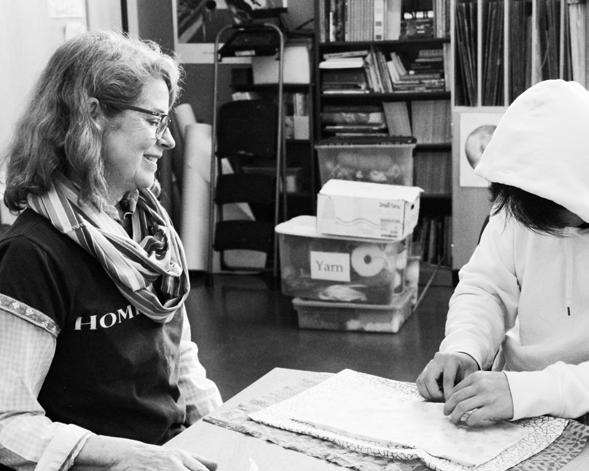
When Ortiz heard she was selected for the award, she said she was surprised but deeply grateful for her colleagues’ encouragement.
“It means a lot,” Ortiz said. “It means [my colleagues recognize] all these 16 years that I have been in this district and all of the effort that [I have put] in. I have my goals, and I’m always trying to improve my method.”
Swearingen said she and her colleagues were delighted when Ortiz was chosen as this year’s classified staff member, and they were proud to see her recognized for her valuable contributions.
“We were all cheering when we found out that she had won,” Swearingen said. “We couldn’t think of any person that would be more deserving than her to earn the award.”
Volume 60 · Issue 7 · May 5, 2023
Editors-in-Chief
Madhavi Karthik
Macy Li
Managing Editor
Karuna Chandran
Production Manager
Hope Saena
Senior News Editor
Erin Loh
Junior News Editor
Nicole Kim
Senior Opinion Editors
Keshav Kumar
Anushruti Nagarajan
Lindsey Steel
Senior Lifestyles Editor
Lia Klebanov
Junior Lifestyles Editors
Saira Ahmed
Brevin Reed
Senior A&C Editor
Amber Birrell
Junior A&C Editor
Rajiv Venkatesh
Senior Sports Editor
Niyatee Jain
Junior Sports Editor
Harshitha Vijayakumar
Senior Design Editors
Seoyoung Hwang
Christine Kim
Junior Design Editor
Mackie Vu
Senior Multimedia Editor
Zeinab Rakhshandehroo
Junior Multimedia Editor
Veronica Zhao
Senior Social Media Editor
Saira Ahmed
Junior Social Media Editor
Annabelle Yip
Photo/Illustration Editor
Joss Broward
Web Manager
Seoyoung Hwang
Copy Editors
Joss Broward
Rajiv Venkatesh Reporters
Ella Chan
Manya Girivasan
Nathan Gu
Patrick Hao
Nicole Pimenta Innecco
David Lin
Brian Ling
Parth Dhaulakhandi
Anderson Picone
Gabriela Salazar
Helen Tam
Evelyn Wang
Faith Watters
Emma Yu
Adviser
Natalie Owsley
Mission Statement
The Epitaph is a non-profit publication at Homestead High School, 21370 Homestead Rd., Cupertino, CA 95014.
The Epitaph is a forum for student expression and not subject to prior review, in accordance to Education Code 48907. The staff is comprised of HHS Journalism students. Views expressed do not necessarily represent views of the school, its staff or the district. Editorials are opinions of the editorial board.
The Epitaph welcomes letters to the editor but reserves the right to edit submissions. Letters should be limited to 300 words. Include contact information. Unsigned letters cannot be published, but names will be withheld upon request. Send via homestead.epitaph@gmail.com, or drop letters in the newsroom or the office mailbox.
If The Epitaph has made an error, please send corrections to homestead.epitaph@gmail.com. The corrections will be published in the corrections box for the next issue. To reach the Epitaph staff in C102 call (408) 522-2572 or fax (408) 738-8531.
Advertising
One email and you can reach over 2,400 students, teachers, administrators and community members from Nothern Sunnyvale to Southern Los Altos. If your target market is between the ages 14 to 18, contact The Epitaph at epitaph.ads@gmail.com, and we can make it happen.
Giving professors and teachers feedback is not a new concept, with sites like Rate My Professors existing for as long as I can remember. The purpose of these sites is reasonably simple, with students critiquing educators
anonymously and providing feedback that can be highly beneficial during course selection. Having a modified, administration-run system to offer teacher critiques would be advantageous for HHS students, as repeated feedback could push for positive change.
Due to the power dynamic between students and teachers, giving educators direct feedback can be a daunting task for many students, as teachers are in control of their grades. Thus, many students fear retaliation and would rather
Pension policy determines the financial security and comfort of retired elderly populations, and it is a critical issue across the world, such as in the United States.
By Zeinab RakhshandehrooMassive demonstrations have swept across France this month in response to a change in the government’s policy on retirement. President Macron’s pension reform raises the age of retirement from 62 to 64, and its passing has sparked widespread anger and backlash among both younger and older generations, according to CNN.
The protests have been extensive, with union strikes leaving France without the service of many of its essential workers, such as teachers, transit workers, garbage collectors and oil refinery workers. More than 1.28 million protesters left many without transportation or electricity, while garbage piled up in the streets, according to Forbes.
The severity of the protests may seem unwarranted — at first glance, a two-year increase in the legal retirement age is not a significant change. However, pension policy is an incredibly important and impactful factor in many people’s lives, and not just in France.
As of 2021, 5.8 million people aged 65 and older live in poverty in the United States, many of whom rely on Social Security benefits for 90% of their income, according to the Congressional Research Service. Even with pension benefits, many Americans are left struggling during retirement. Although the issue of retirement and pension may seem far off and irrelevant to us, it is important that we plan ahead for our future. As we enter adulthood and begin our careers, retirement will become an increasingly important part of our lives that we will need to prepare for.
Current U.S. pension policy sets the age of retirement at 67 for full benefits, according to CNN, a far greater number than that of France’s new policy. Yet, the French public are the ones advocating for greater pension reforms, not Americans.
Our generation’s lack of care and concern for pension policy in the United States is a concerning form of ignorance. By not addressing this issue, we put ourselves at risk of financial and mental strug-

We must use the events in France as an example for ourselves to advocate for better retirement and pension policy. Retirement is an essential right that we rely on for our futures, and it is imperative that we fight for it.
stay quiet or sugarcoat their criticism, according to a 2014 article by quantitative data analyst Darrin Thomas. Whenever I am faced with giving direct criticism, for example, I worry about sounding rude and confrontational.
Despite its challenges, providing teacher feedback offers insight into a teacher’s abilities and helps improve the course. A personalized system would allow administrators to view data and discuss issues with teachers privately, eliminating the power dynamic.
However, there are several downsides to sites like Rate My Professors. Similar to sites such as Yelp, students often go online to either praise or complain about a teacher, leaving little room for nuance.
For example, if a student earned a bad grade on an exam, it is difficult to tell whether the teacher failed to teach the material, or if the student did not prepare adequately for the test.
While anonymity protects students and allows them to be honest, anyone can leave a review,
and students can make multiple accounts to drive down a teacher’s ratings. Conversely, teachers can rate themselves to encourage students to take their course.

Therefore, an ideal system would be an anonymous online form that limits the responses to one per student, with admin collecting responses and sending them to teachers. That way, students could have true anonymity, while teachers could view the feedback without linking responses to individual students.
The only foreseeable pitfall of an online anonymous feedback system is that students could not be forced to fill out the form, so not every student’s views would be represented. However, this issue can be mitigated by actively promoting the form and encouraging all students to share their opinions.
A school-managed feedback system guaranteeing the best of both worlds — honesty and anonymity — would be a vital resource to students and teachers alike, creating a more open and effective learning environment. Submitting feedback at the end of each semester would allow administrators to compare data and gauge the improvement of instructors throughout the school year.
Feedback is a crucial component in improving courses and allowing for growth, creating a more positive work environment and benefiting the HHS community. Ultimately, a feedback system would have a lasting impact on classes for years to come.
I always knew God’s love was endless. No matter who we are or what we have done, he would never abandon us in our darkest times. However, in the past few years, I have been ashamed of my devotion to Christ.

Growing up with my church, I was often told that God’s love was selective. If someone was gay, transgender or what the church deemed “sinful,” that person was not worthy of his love. Their beliefs were heart-shattering to accept as my own, and over the years, constant exposure to this hate drove me away from the church and further from God.
weapon, justifying their wrongful acts of discrimination against others.
As I distanced myself from God, I started to feel resentment toward my religion. Since I was constantly surrounded by the idea that Christianity was merely hate, I began to believe this misconception too.
However, in the back of my mind, I knew this wicked interpretation of God was untrue. I soon realized that instead of distancing myself from God, I should have turned my back on those who tried to define what God meant to me.
In my eyes, God is forgiveness, patience, strength and warmth. He has blessed my life with many lessons and people to love, and he has nurtured me to become the person I am today.
While others may use his word as dynamite, it does not mean that I cannot empower and embrace whomever I come across. His endless love inspires me to live my life in his service, becoming the best version of myself. No matter what one may say or do to influence my relationship, I know it is just
Opening up is scary. We often try to avoid displaying our true emotions and thoughts, fearing that we may be perceived as weak or inadequate. In reality, vulnerability is essential for building strong relationships and living a fulfilling life.
Accepting our weaknesses and flaws allows us to work on self im-
provement and become the best version of ourselves. When we hide our vulnerabilities, we limit our potential and remain stagnant in personal growth.
By sharing our struggles with others, we create opportunities for empathy and understanding, allowing us to form connections on a deeper level, according to Psych Alive. This, in turn, builds trust and strengthens relationships while also creating a safe and supportive environment where others also feel comfortable opening up.
Not only does vulnerability foster meaningful connections, but it also opens our eyes to new
ideas and solutions. For example, if one team member opens up and has the courage to share their thoughts, other members will follow their lead and feel more comfortable, too, according to Forbes.
Furthermore, vulnerability is not a sign of weakness, but rather a sign of courage. It takes courage to show our true selves, admit when we are wrong and ask for help. When we embrace vulnerability, we become more resilient and better equipped to handle life’s challenges.
However, embracing vulnerability can often be a daunting task, requiring self-awareness, maturi-

Is it a Marvel movie trailer? Is it a video game ad? No — it’s military recruitment! Whether it be a multi-million dollar operation to prey on 13-year-olds on Twitch via a U.S. Army Call of Duty-streaming account or luring a crowd of high schoolers to watch a pull-up contest in the quad, the U.S. military constantly engages in shady tactics to recruit impressionable teenagers into service without giving them proper information, according to the ACLU.
Since 1995, there has been an increase in the representation of minorities in the military, according to WIRED. Taken alone, this fact may seem relatively innocuous. However, it is not without reason — the military disproportionately targets low-income youth and students of color, according to an ACLU report evaluating recruitment activities at schools with higher percentages of African American, Hispanic and Native American students. The military understands financial burdens associated with college and utilizes exaggerated claims of college aid and financial opportunities to convince low-income students and students of color to enlist.



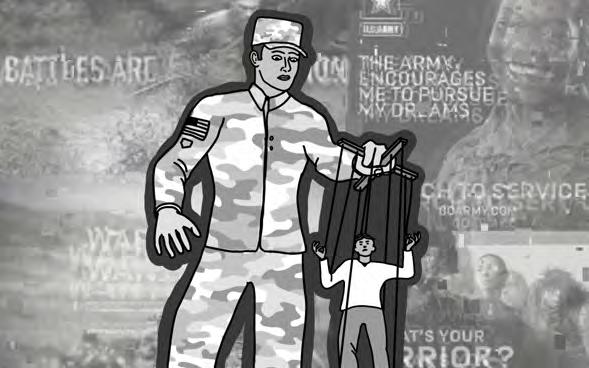
At the same time, corporations have widely benefited from American-led or supported armed conflicts. Since the post-9/11 surge in military spending, Pentagon spending has totaled over $14 tril-
lion, with over one third allotted to defense contractors, or corporations that provide products or services to the military, according to a study from Brown University. So, while predominantly low-income communities and people of color face the brunt of war both in the U.S. military and international civilian populations, the wealthy continue to profit.
The reality of war is, of course, glossed over in recruitment ads and in-person events, which prioritize foolish notions of American exceptionalism and the claim that the military is “defending freedom.” In the words of Susan Sontag, famed cultural critic, “War is elective. It is not an inevitable state of affairs. War is not the weather.”
While the hegemonic view of war and American-backed conflict is that of an imperialistic fairy tale, the permanence of war on the human psyche is a truth left out of the military recruitment process. In reality, those in active military

service, especially younger soldiers, experience increased mental health risks, including substance abuse and suicide, according to the National Institutes of Health.
Yet, as a result of the No Child Left Behind Act, public schools are required to allow military recruiters on campus and provide student information to recruiters (thanks, George Bush).
However, the FUHSD administration can counter predatory military recruitment in our schools by providing accurate, unbiased information both in and outside of class about the risks of military service, as well as the historical harm caused by the U.S. military.
As parents, it is essential that you understand your right to opt your child out of their information being involuntarily given to recruiters. And, as students, we must question the institutions woven into the fabric of our country and the rhetoric with which we continue to be faced.
ty and self-acceptance. Yet, over time, opening up to others will become easier, and we can start to feel more comfortable and confident in our vulnerability.
Ultimately, accepting ourselves and embracing vulnerability is crucial to our emotional, social and personal growth. By allowing ourselves to be vulnerable,
we build stronger relationships, and by opening up, we develop as individuals and become more resilient. So, do not be ever be afraid to wholeheartedly embrace your vulnerability and take your relationships to a deeper, more authentic level.
In my computer programming/ Java class during my freshman year, a long-term substitute replaced my teacher when he went on paternity leave at the end of the first semester.
Although the substitute was friendly and eager to teach the class, he had little knowledge of the Java coding language, making it difficult for students to learn the course material.
As a result, my test scores dropped, and I became worried about not only my grade, but also my level of preparation for AP computer science A, the course following computer programming/ Java.
However, I was not alone in these struggles. Many students around me complained that they were unfamiliar with the course’s topics and that their grades plummeted. Cindy Wang, a junior who also took computer pro gramming/Java last school year, said that although the substi tute was a fun per son, he was not qualified to teach the sub ject.
Compared to computer pro gramming/Java classes taught by other teach ers, my class covered the
material at a slower speed, with a large percentage of students failing to grasp the concepts. Additionally, there was a lack of support from the substitute, as he, being unfamiliar with the material himself, was unable to help students.
Yet, addressing this issue can be a challenging task for administration. Administration always aims to hire a qualified person, principal Greg Giglio said, but sometimes, despite having the required credentials, there can be other factors, such as a substitute’s teaching style or organization, that make them unfit to teach the class.
In those types of situations, numerous complaints are generally received from students and parents, and the substitute in place then gets removed.
studentsfrommasteringimportantskills. (IllustrationbyManyaGirivasan)
Ultimately, finding qualified long-term substitutes is crucial to preserve the quality of students’ education, which is why schools must change the hiring process to be more thorough. Substitutes play an integral role in students’ success and learning, and it is absolutely necessary to have teachers who will help us prepare for our future educational goals.
By Saira AhmedAdding color will improve our school of murals or individuality contrasts with what a school campus should be. I came from elementary and middle schools that were filled with murals and personalities, yet the biggest attraction at HHS is a metal horse statue.
Our campus is not known for its beauty. The bland, industrial
Other schools within the FUHSD have splashes of color throughout their campuses. For example, FHS has rows of colorful flowers at its entrance and a large painting of the firebird mascot on the wall of the gym.
To bring life and character to our campus, HHS should incorporate areas with lively plants and
In between the C and L buildings, there is a mini garden that I smile at every time I walk by. It is beautiful yet simple, and if we had more of these natural touches sprinkled throughout our school, it would transform our dull
campus into a brighter one.
Additionally, students may enjoy taking care of those gardens as a part of clubs or classes, especially those who are interested in nature and the environment.
When I worked on our garden at West Valley Elementary, it was an exciting and enriching experience.
School gardens help students foster a greater appreciation for the environment, and students who contribute to them gather lifelong skills and lessons about food, according to the Sustainable Food Center.
This is applicable in high school, since group projects like gardening not only help us gain more knowledge, but also create stronger bonds between individuals working together to create something beautiful.
In addition to gardens, murals could also add more personality to our campus and create oppor-
tunities for student bonding. Students in our many art classes and creative clubs can work together on these projects to produce collaborative murals that are unique to HHS and showcase their own personalities.
There are many empty walls throughout campus that are begging for a splash of color. What better solution is there than to display bursts of students’ originality and creativity?
Ultimately, creating projects that foster communal growth and bonding is not only beneficial, but essential for any student body.
Although some of these changes may be time consuming or costly for the school to implement, brightening someone’s day is priceless.
Students will benefit fromcontributingto communalprojects such as murals and gardens,aswellas fromhavingamore vibrantcampus.(IllustrationbySeoyoung Hwang).

Accountability is one of the pillars of our democracy. The United States is supposed to be a country where nobody is above the law, so when our leaders violate democratic principles, they must face the consequences. They cannot be allowed to evade responsibility for their actions because of their power and privilege.
Former President Donald Trump was indicted on March 30 on charges of falsifying business records. These counts are based on Trump’s classification of hush money paid to Stormy Daniels, with whom he had an affair in 2016, as a “legal expense,” according to the New York Times.
difficult to prove. Lying about business records as Trump did is a misdemeanor. However, prosecutors in New York have claimed the payments made to Daniels were part of a larger conspiracy by Trump’s campaign to undermine the 2016 election, so he should be charged with a felony, according to The New York Times.
Given the complexity of the situation, it is fair to be skeptical of the charges against Trump. However, by trying to impede the progress of the case, Trump and his allies are undermining our judicial system and democracy.
The judge overseeing the indictment, Juan Merchan, warned Trump not to make incendiary comments about the proceedings, in an attempt to avoid inciting any unrest or violence. This message was completely lost on Trump, who attacked Merchan’s wife and daughter for their political leanings in a Truth Social post, claiming without evidence that they were “Trump-hating” and working for the Democratic Party, according to Insider.
Trump’s comments and actions are a test of the strength of American institutions. (Illustration by Macy Li)
Throughout high school, college has always been on my mind. Over the years, I have tried to do everything possible to get into a good college — take AP classes, have multiple leadership positions, participate in a sport and even enroll in academic classes outside of school. These options are often available to students in our community, due to their low costs and accessibility.
However, as college pressure mounts, many teens are applying to pre-college summer programs. 51.5% of 101 respondents to a survey conducted by The Epitaph reported applying to or attending programs hosted by well-known universities to further increase their chances of admission.
Contrary to other academic and extracurricular activities, the majority of these programs cost thousands of dollars to attend, making them inaccessible to many families.
For example, a one-week course at Columbia University without a meal plan or dorm costs $2,825. At Harvard University, students pay a whopping $5,300 for a two-week course, which includes a meal plan and dorm. These prices are an astronomical amount for a week of knowledge and a resume boost, but unfortunately, this trend is not unique to Ivy Leagues, with a two-week course at Notre Dame University costing $4,475. Regardless of the institution, these costs are absurd and pose a financial burden to the majority of families.
But the costs do not stop there. Each of these programs has application fees upwards of $75 and enrollment fees upwards of $150. Furthermore, the program costs
Unfortunately, Trump’s allies are following his example.
Many influential Republicans, including Speaker Kevin McCarthy, have accused Alvin Bragg, the prosecutor trying Trump’s case, of abuse of power. McCarthy has also demanded that Bragg turn over the evidence his case is based on, which is an overreach of congressional authority, according to FiveThirtyEight.
Both Merchan and Bragg have received threats to their safety from Trump supporters because of the proceedings, so extra security details have been assigned to protect against potential attacks, according to NBC News.
Trump has a right to offer his perspectives on the charges being brought against him. However, he has no right to endanger the life of the judge before the trial has even started. By accusing Merchan of being a corrupt actor with political motivations, Trump turned his entire following against him, emboldening his supporters to take matters into their own hands.

In addition, through these words, Republican politicians are showing total distrust of our legal system. Instead of waiting for the verdict, they are trying to bully legal officials who are doing their jobs. This only emboldens Trump supporters who are willing to use violence to return him to power.
We must remember that Trump presents a unique threat to democracy. He has the potential to escalate even the smallest of controversies into conflicts
MIT’s Research Science Institute
Duration: June-August
Requirements/notes:
Juniors. There is also a $40 application fee with a needbased refund.
on the national scale. The indictment demonstrates just how easily Trump can create threats to civility and the rule of law.
We have already seen that many conservatives will resort to inventing conspiracies against Trump rather than admitting he is destroying our country. At some point, we must ask ourselves how many more incidents like this
must happen before American democracy is irreparably damaged. Our future will not simply sort itself out. We must use the rights we are given. Whether it is exercising free speech, protesting or voting, we must wield every tool in our arsenal to preserve the stability of democracy. If we fail to take this path, those rights could be stripped away from us.
Tennessee is trying to put drag queens out of style, with the state just passing one of the country’s most restrictive and discriminatory laws directed at drag queens and transgender youth.
The law, Senate Bill 3, bans drag performances in public spaces and anywhere they might be seen by children, according to PBS. This was passed alongside separate legislation that prevented transgender minors in Tennessee from receiving gender-affirming care like hormones and surgery.

Stanford’s Institutes of Medicine Summer Research Program
Duration: eight weeks
Requirements/notes: Application is open to juniors and seniors. Applicants must be at least at least 16 years old when the program begins.
Carnegie Mellon’s Summer Academy for Math and Science
Duration: five weeks
Requirements/notes: This program is merit-based for underrepresented backgrounds. Applicants must be a sophomore or junior in high school.
exclude the price of books or extra materials needed for the applicant’s specified program, according to each college’s website.
A main selling point of these programs is that many families believe they make students look more appealing during the college admissions process, according to The Washington Post.
In reality, most families cannot afford this expense. One in nine students at HHS is eligible for either free or reduced lunch, meaning a significant portion of our student population is living with family incomes at least under 130% of the federal poverty line according to the National Center for Education Statistics. Being already tight on money, these families cannot even consider sending their children to these wildly overpriced programs.
Having good grades is no longer enough, you also have to be able to pay for these programs, which is rooted in privilege. The pure cost of these programs creates an advantage in college admissions for those who can afford it, and leaves
others struggling to keep up. With college admissions becoming increasingly competitive, the popularization of these programs places low-income students at an even greater disadvantage on an already uneven playing field.
Schools offering pre-college programs must find a solution to help low-income students, whether this means lowering the cost of courses or making scholarships more accessible. It is simply unfair that programs designed to help students in the college admissions process are only available to the families that can afford them.
To truly create an equal playing field for high school students, we must ensure money does not determine the level of one’s education or their future success. Instead of creating more barriers to success for low-income students through the popularization of pre-college programs, we must provide them with equal access to educational opportunities. These changes will ensure all students, not just the wealthy, have the same chance to achieve a successful future.
Senate Bill 3 is expected to take effect on July 1, according to CNN. While the restriction does not outrightly ban all drag shows, the vague wording of the law allows for a very broad interpretation of it by law enforcement, meaning drag performances anywhere in Tennessee are, in effect, banned.
The law specifically bans “topless dancers, go-go dancers, exotic dancers, strippers and male or female impersonators in the presence of minors,” according to the Tennessee General Assembly. Can you spot the odd one out? Tennessee legislators certainly cannot.
The issue with this is clear: placing drag queens in the same group as adult performers makes absolutely no sense. Drag queens are a beacon of hope and pride for young queer people, showing them it is okay to be unapologetically yourself, no matter who that may be.
Drag shows have existed since the 1920s, and drag queens have been a core part of queer culture and protest. Marsha P. Johnson, one of the most influential and recognizable people in queer history, was a drag queen who led the Stonewall riots and transformed the LGBTQ+ liberation movement in the 20th century, according to PBS. This history is ingrained in queer culture, and it is too rich to ignore and brush away as unimportant.
Even today, drag queens like RuPaul continue to be a source of inspiration and admiration for queer people everywhere. Tennessee’s drag ban eliminates a key space for young queer people to find solidarity among each other.
The justification for Senate Bill 3
does nothing to address these issues and instead attempts to conflate drag performances with strippers and other adult performances.
This spells disaster for young trans people in Tennessee, who will be robbed of the opportunity to celebrate their identity rather than hide from it.
As a young queer person who has been to drag shows, I have never felt uncomfortable or unsafe while watching them. Instead of having sexual or provocative content, they were a celebration of being authentic and comfortable in your own skin. I felt empowered being surrounded by such a supportive community, and I would never want that experience to be taken from someone.
It is honestly laughable that the legislature is choosing to spend their time on this matter instead of the real issues affecting their citizens, such as public health and crime. In fact, Tennessee is currently ranked 40th in health care and 42nd in crime and correction, according to US News.
Sadly, this is not an isolated issue. Since the beginning of this year, at least 32 bills in various states have been introduced targeting drag performers, according to The Guardian. Each and every one of these bans strips away an essential aspect of queer pride.
Yet, organizations like the ACLU are working to fight back in the courts against these damaging laws. Donating, spreading awareness and sharing your own stories are all critical in the battle against inequality.
Restrictive laws like these do not change the truth of who we are, and they should not hinder our determination to foster a safer and more inclusive society for the sake of future generations. So when you have the opportunity, fight alongside the LGBTQ+ community to show them they are not alone and never have been.
Drag shows celebrate queer pride and confidence, rather than indoctrinate children, as the new bill suggests. (Illustration by Faith Watters)
Pre-college programs are not affordable
 By Lindsey Steel
By Lindsey Steel
From traditional classes such as chemistry to project-based courses like science and society, HHS offers a variety of science options for students to choose from. However, one class is absent from this array of choices: psychology.
In response, psychology club aims to shine a spotlight on the subject and expand students’ interests beyond the current curriculum, club co-president, senior Amelia Craciun said.
To spark interest in the subject, the club combines informational meetings with handson activities, requiring students to apply the concepts they have learned, co-president Melody Shane said.
“For our meetings, we’ve had topics about personality disorders and anxiety,” Shane, a senior, said. “We always have interactive activities too, so when we discussed personality disorders, we did case studies where our officer team came up with different patients and had members try to diagnose them.”
The club has also covered love languages and the psychology behind them for Valentine’s Day, Shane said, and held discussions about personality tests and the importance of mental health.
While there are other clubs on campus centered around health and wellness, Craciun said psychology club has an awareness-based approach.
“We [approach these issues] from an educational standpoint,” Craciun said. “Students can learn about different disorders, and if they identify with any of them, no matter how
For as long as senior Andrew Park can remember, he said, writing has been part of his life — first writing for fun, and after quarantine, a therapeutic and fulfilling channel for self expression.
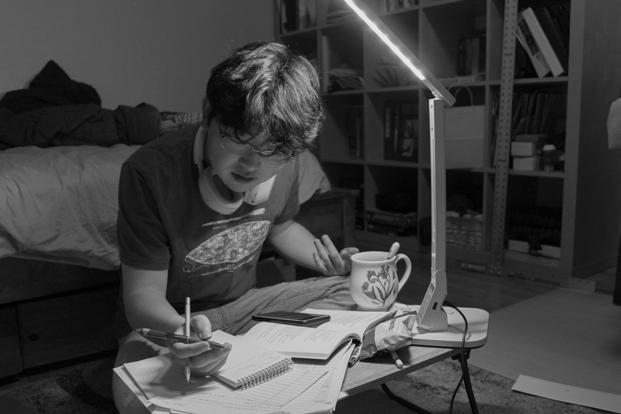
Park is a writer who has dabbled in writing poems, plays and short stories, and said he enjoys exploring different writing genres.
“Part of creative writing is doing things that you’re not familiar with,” Park says. “I like to write about desperation and regret because I am growing up. I’m looking back on the things that I regret and that’s the emotion that drives a lot of my writing currently.”
Abigail Song, a junior, gears toward writing short stories. Song said short story writing is a liberating experience, allowing her to explore her creativity.
“Short stories are kind of my thing because I like reading them,” Song said. “I’ve been also trying to get into poetry, but mostly prose poetry, because that’s what’s closest to short story writing for me.”
One of Song’s favorite pieces she said she has written is her award-winning short story
“Life is Brief,” which was nominated for the National Scholastic Art and Writing American Voice Award. “Life is Brief” features a turbulent plot, touching on serious topics like violence and discrimination, Song said.
“It was my first short story that I wrote, and my only finished one,” Song said. “I wrote it in the HHS library during my free third period, after I felt inspired by watching the movie ‘Memento’ directed by Christopher Nolan. I tried to weave in a similar sort of unexpected timeline into my short story.”
strongly, we can teach them how to seek help.”
Junior Sreya Gudipati, who has been involved in the club for over a year, said she initially saw it as a way to expand her interest in the subject after taking summer psychology courses. But since joining, Gudipati said the club has opened up opportunities for her beyond academics.
“One of the best events was when a guest speaker talked about her organization based on classical dance and how her journey in psychology evolved,” Gudipati said. “Now, I’m interning for her organization.”
Although the club educates students about the various aspects of psychology, Gudipati said the most important part of the club is its emphasis on promoting physical and mental well-being.
“This club educates students about the importance of taking care of themselves,” Gudipati
themes of social issues.
Poet Conner Olesek said the discrimination he has faced influences his writing immensely.
“I write about mental illness awareness because I’m also struggling with mental illness, and not enough people are aware of it in the right ways or enough,” Olesek, a freshman, said. “I write about LGBTQ+ stuff because I have a lot of friends that are LGBTQ+ and I’m bisexual.”
Olesek said poetry is a powerful tool that can connect people, especially those with different backgrounds.
You want to evoke emotion in people and get them to feel similarly for social issues [you write about].
Both Park and Song said an author has inspired them to start writing. Park said poets Richard Siken and Sueyeun Juliette Lee are his favorites.
“[Siken] has a very panicked, desperate style about him that is great,” Park said.
“Sueyeun Juliette Lee also does this blend of the technological and ephemeral, transient style of writing that I love.”

Although Song does not center her writing on political activism, she does incorporate
said. “In the club, we’ve created posters about what healthy habits look like, which has [helped us learn] how to create better lifestyles overall.”
Ultimately, Shane said the goal of psychology club is to ensure students not only learn about prevalent psychological
disorders, but also feel included.
“We try to form a community where we can cover topics that might not be easy to talk about,” Shane said. “We also want to create an open space to discuss these issues in an educational and accepting way.”
COLUMN — It is crazy to think that in just a few weeks you will be graduating and saying goodbye to a routine that has lasted for almost 13 years. From the countless assignments to navigating your place in the HHS community, the road to this point has had its fair share of hardships.
a function. However, instead of wanting to finish the work as fast as possible, relish the learning process and dive deep into the infinite amount of possible knowledge. While it may seem like you will never use these facts again, they shape your overall world perspective while also coming in handy at the next game of trivia.
Conner Olesek
“Poetry connects me to people because it’s one of the most emotional types of writing,” Olesek said. “You want to evoke emotion in people and get them to feel similarly for social issues [you write about].”
Building a writing community can be a powerful way to connect with other writers and find support for those looking to improve their craft, Song said. In fact, Song said her writing community has helped her through her struggles as a writer.
“I haven’t built up a huge community yet, but the few people I have met are just so encouraging and so kind,” Song said. “Over the summer I met some amazing writers, and they are the closest I’ve ever had to a writing family. It was my first experience with a group of people like me that love to write. It’s scary to get judgment or feedback, but in my community, everyone was really encouraging and it’s the first time I feel like I received genuine and raw constructive feedback on writing.”
Today, I would not even remotely change my high school experience. Every aspect has shaped me into the person I am today. Now, as a somewhat knowledgeable se nior, I have some wisdom to share with you and other stu dents.
First off, do not be afraid to try new things. This may sound cliche, but high school is truly the time for exploring your interests, which starts by putting yourself out there more often. Do not hesitate to talk to new people or join a club. These experiences often turn out to be some of the most monumental moments in your life. For example, I joined FBLA in my sophomore year, solidifying my goal of pursuing a business career while learning some valuable lessons including how to travel independently.
It is easy to fall back on our habits and stick with what we know best, but you can never grow as an individual without going outside of your comfort zone.
Secondly, embrace the unknown. There are going to be times when you will have to spend hours trying to understand the inner workings of DNA replication or integrating
Lastly, know that everything always works out for the best and can teach you valuable lessons along the way. STEM-related subjects have never been my forte, but I decided to enroll in AP biology my junior year as a challenge. In the beginning, the class was truly difficult and I was disappointed with some test grades that did not go exactly as planned. After reflecting, however, I learned that it was crucial to understand that getting a bad grade is not the end of the world you might think it is. By the end of the school year, I had developed new study habits and felt an immense sense of pride for my perseverance in my classes. The end result was truly worth all the struggle.
Remember, you define yourself, and nothing or no one else has the power to decide your worth. Any kind of life setback is a gifted moment to ponder, redirect and move on.
Most of all, I am proud of how far you have come and your ability to stay true to yourself in a world of chaos and uncertainty.
Even though the future remains unknown, I am confident we will get through it together.
Signing off, Lia
The echoes of protests for women’s suffrage in the early 1900s can be heard in today’s movements such as MeToo: a world free from sexist discrimination.
From feeling ashamed about being a feminist to eventually gaining a passion for advocacy, senior Abigail Berwick said she plans to continue working towards pushing back against stereotypes about feminism by majoring in gender studies.
“I felt pressure when I was younger to not be a feminist because people said it meant that I hated men, but that’s not true at all,” Berwick said. “Now, I feel a lot less shame about identifying as a feminist or advocating for people who are LGBTQ+. If somebody is homophobic or hateful, they should be ashamed, but pushing for equality should never be a shameful thing.”
Berwick said she finds feminism
feeds into the general notion of equality for all people, regardless of gender, background or race.
Women’s demands for justice can be seen throughout the world and often aids protesters in becoming more confident in themselves and their beliefs, Berwick said.
“Nowadays, a lot of feminism is focused on protecting women against sexual harassment, the LGBTQ+ community against all of the restrictive laws that are coming out and people of color from racism and hate crimes,” Berwick said. “[Feminism is] all encompassing and it’s hard to say that there’s one specific focus because it can be so expansive.”

These issues are nothing new, Foothill College professor Rachel Standish said.
In the late 1980s, Standish said she attended a reproductive rights protest, inspired by the book “The Handmaid’s Tale,” which had just been released. Although the issue seemed extremely pressing to her then, she said it has become much more serious today.
In AP English literature, teacher Debbie Vanni said there is a short-story unit where many of the writings
focus on the experiences of women throughout different time periods and in various locations. The works of authors Toni Morrison, Kate Chopin and Tilly Olsen highlight the complexities of womanhood, especially for women of color.
“[All the short stories have] women as their protagonist, and I wanted to play those out together and to see [powerful] women, who often aren’t necessarily seen as complex characters,” Vanni said. “Also, how people judge you as a woman, not only in what you provide, but where you fail when you provide. In two of the three stories, a man takes off and there’s a lot of judgment on the woman who’s not doing things right.”
Hoping to understand these experiences, English and AVID teacher James Aguirre studied at UC Davis with an emphasis on interdisciplinary studies, where he learned about the intersections between race, class and gender.
“When I learned about the social construction of race or class, I just never heard of any of this,” Aguirre said. “I thought it was fascinating to learn about gender roles and expectations and how queer people fit into the whole discussion was really eye opening. It
 By Rajiv Venkatesh
By Rajiv Venkatesh
Senior Radhika Agarwal said she has been involved in STEM fields all her life, studying subjects ranging from computer science to the environment.
As co-president of Girls Who Code, a branch of programming club, Agarwal said she was inspired to start the club after attending her first programming club meeting as a freshman and finding that there were no other girls there.
“After that experience, I didn’t show up again that year,” Agarwal said. “Why would I make myself uncomfortable every single meeting?”
Once Agarwal became an officer in her junior year, she realized she now had the power to create change in the club.
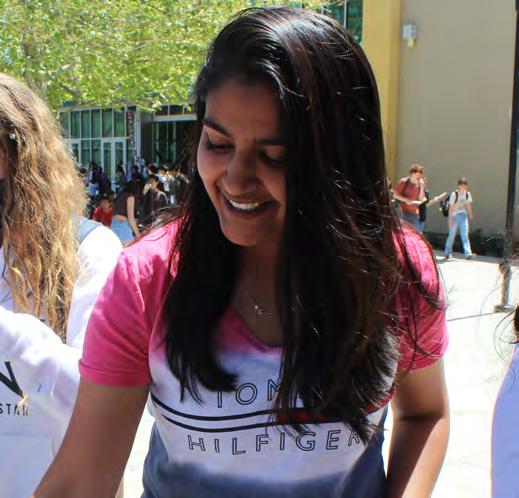
“In my freshman and sophomore year, the programming club was basically all guys,” Agarwal said. “Even if we saw a couple of girls show up, they would always look really uncomfortable, so we [made] a community full of women and nonbinary students.”
As the only girl on the wrestling team, freshman Brooklyn Borges began wrestling in middle school.

“I wanted a sport where I could fight people, so I joined wrestling and I really liked it,” Borges said. “I tried lots of other sports before and I didn’t like any, but I tried wrestling and I enjoyed it.”
While being the only girl on the team hasn’t affected her performance, Borges said she that having another girl would provide her with more comfort and support. That being said, she takes pride in defying gender norms in sports and feels a great sense of accomplishment.
“I would rather there be another girl, but at the same time, it doesn’t matter that much,” Borges said. “I first joined because I liked fighting people but I used to have doubts. In my first year I didn’t win any matches, but I kept doing it and I got better at it.”
just made sense to me as a young queer person.”
On the other hand, Standish said her experiences as a student did not expose her to the full scope of women’s accomplishments throughout history.
While in high school, Standish said she had a U.S. history teacher whose attitude towards these achievements was particularly dismissive.
“One woman asked [my teacher] why there were not more black people or more women in our textbook, and he said it was because ‘they haven’t done anything important,’” Standish said. “Because of that experience, getting to take a women’s studies class in college was fantastic. It opened my eyes to the pervasiveness of that sort of
attitude. Now, when to focus on all kinds sure no one has the
Berwicksaidshehopestoshedlighton enthroughouthistory.(Illustrationby
I teach history, I try of people [to make same experience].”

Gave women the right to abortion in most cases with limited state regulation. The decision expanded Griswold v Connecticut, which gave women increased access to contraception. Both cases greatly increased women’s freedom, their right to privacy and status in the workforce.
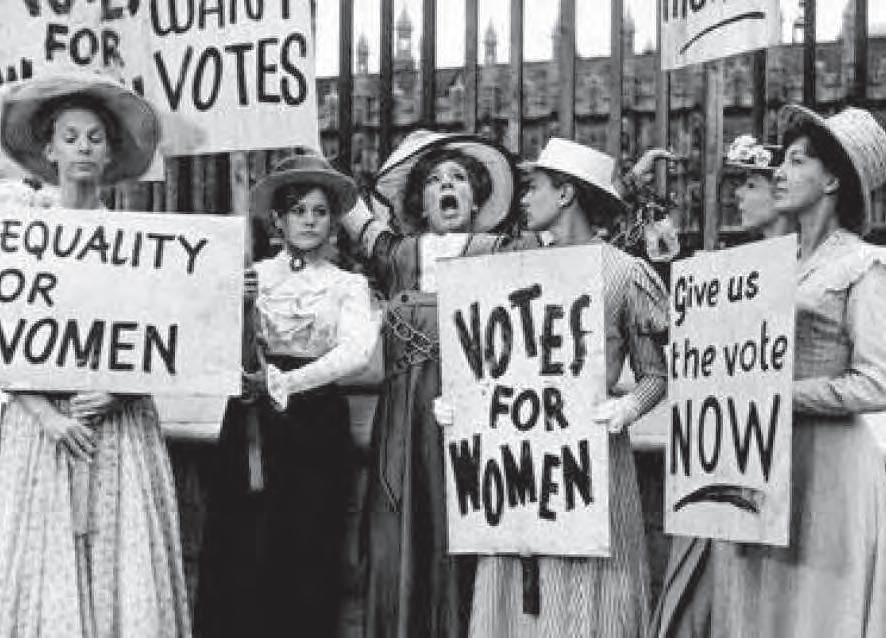
1848: Seneca falls convention
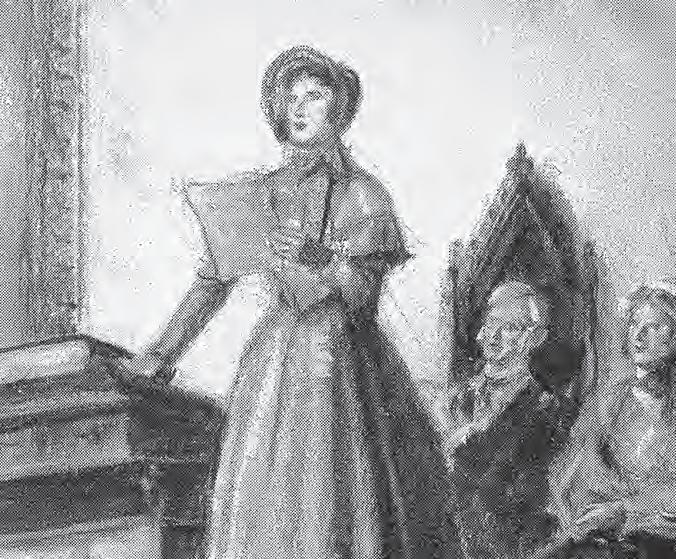
Held in Seneca Falls, New York, this first women’s right convention launched the women’s suffrage movement. Additionally, it united women in the gender equality

onthelivesofwomEllaChan)

1991: Anita Hill trial
Anita Hill made history by testifying before Congress about the sexual harassment she said she faced from then Supreme Court nominee Clarence Thomas while working as an adviser in the Equal Employment Opportunity Commission. This was the first time a woman had publicly shared her account of workplace harassment.

According to History Channel, The Washington Post, New York Public Library and Maryville University.
The Riot grrrl movement believed in girls actively engaging in cultural production, creating their own music and publications rather than following existing materials. The bands associated with Riot Grrrl used their music to express feminist and anti-racist viewpoints while reclaiming gender roles.

Widespread movement that encouraged women to share their experiences with sexual violence and harassment, with predators such as Harvey Weinstein being brought to light.


Decided that abortion was not a protected right under the Constitution and overturned Roe v Wade. and leaving abortion regulations back to the states.
2022: Overturn of Roe v Wade


“[Feminism is] ensuring that there’s equal opportunities for women, particularly women of color [and] making sure that our voices are heard and all women have a seat at the ta ble. In that regard, I am a femi

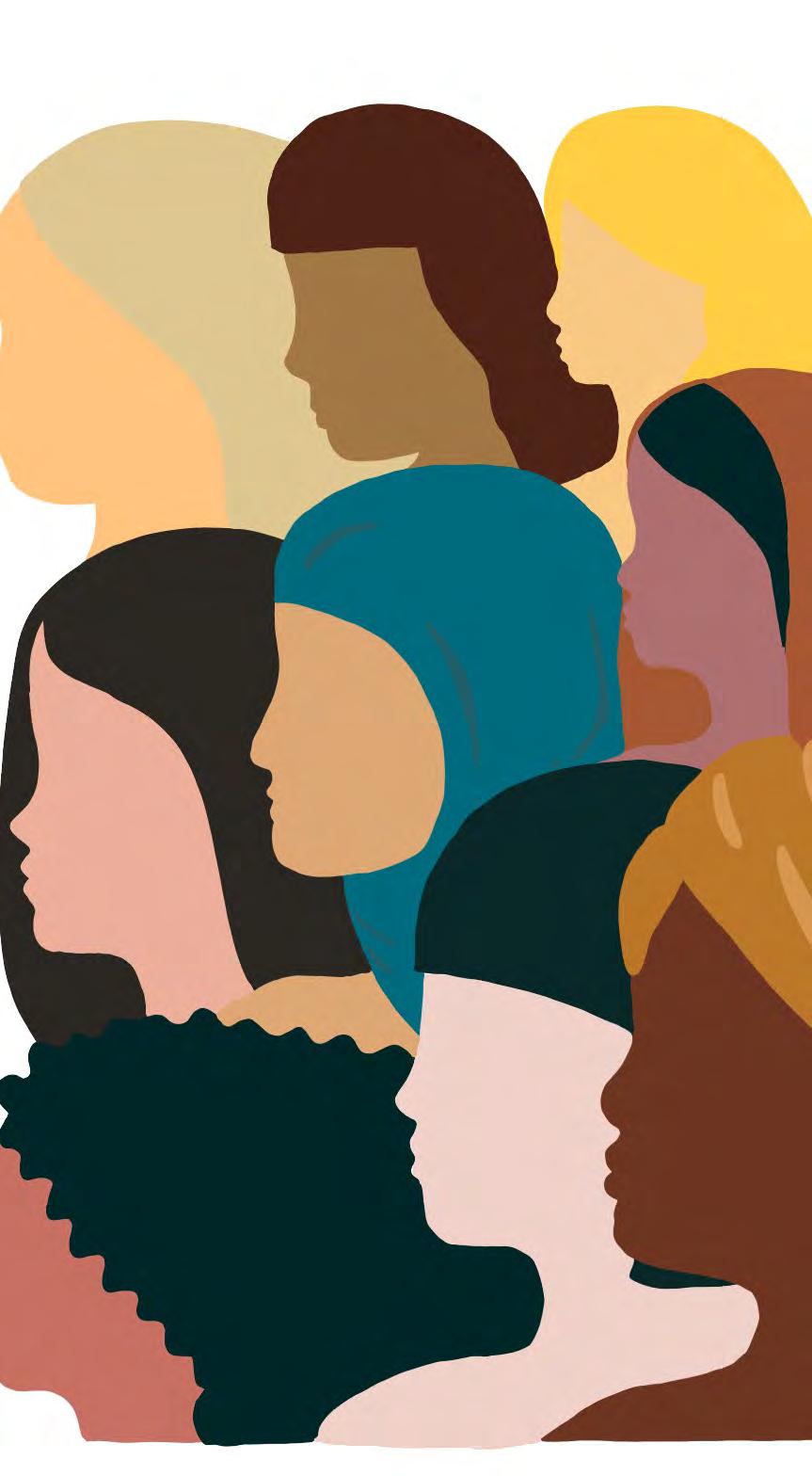
Edwin

“I do kind of consider myself a feminist, but I don’t support the type where they shove ideas in front of other people’s faces and make them believe in something that they don’t want to.”
“Agreeing with feminist ideals and not calling yourself a feminist contributes to the idea that feminists are too angry and radical, so I think it’s a word that should be
A landmark amendment that grantedallwomentherighttovote, regardless of race,and despite vocaloppositionfromanti-suffragists. The amendment cultivated a decades-longstruggle.
‘TheFeministMystique’Thebookarguedforwomento expandtheirrolesinsocietypast thedomesticsphereandhave equalpay.Sparkedasecond waveofwidespreadsupport for gender equality and gavevoicestofrustrated women’.1973: Roe vWade
HHS’ band is a diverse group, rich with musicians who play a variety of instruments. However, trumpet player, sophomore Matilda DeSeve said outsiders may make assumptions about the niche culture of band and believe in section-specific cliches.
Aside from participating in musical ensembles at school, aspects of these students’ personal lives revolve around the band community, which are often misinterpreted, DeSeve said.
“I don’t interact with many people outside band,” DeSeve said. “I know for a lot of us band kids, most of our social life is within the community itself. We could come off as aloof or stuck in our own world. I know many of us aren’t looking to make more friends, but I wouldn’t say we are actually aloof.”
Similarly, senior Karen Asakawa, the bass clarinet section leader and a tenor saxophone player, said the band members are a tightknit group. Many may assume these “band nerds” spend 24/7 in the band room, which is true for some, but not all, Asakawa said.
“We feel most at home with our band friends, and we all find ourselves wandering back to the band room and there’s always someone in there,” Asakawa said. “However, I think the stereotype is very cliche. Though it does seem like I spend all day everyday in the band room because of the three music classes I take, I do have friends outside of band, as well.”
Sophomore Thien Mai Vu, a student who does not participate in band, said she agrees the band community is very tight-knit and often finds it difficult to connect with members.
“I think [band kids] are very cliquey with each other,” Vu said. “They always have some type of inside joke, and they make it very public. Sometimes, I also feel excluded because I don’t know what they’re laughing or talking about.”
Apart from the stereotypes associated with being in band in
Bandcreatesasafespaceformusicians’uniqueidentities, Asakawa said. (IllustrationbyManyaGirivasanandVeronicaZhao)

general, there are many stereotypes associated with playing certain instruments, DeSeve said.
“A lot of people think [flute players are] full of ego and we’re tryhards on our instruments,” freshman flue player Claire Lee said. “That’s not necessarily true. Not all flute [players] care that much.”
As someone who plays multiple instruments, Asakawa said she has faced stereotypes for both sections. She said she has ironically played a role in formulating the cliche that the bass clarinet section is abnormally loud.
“I’m the one that started the stereotype that bass clarinets are super loud because Mr. Burn says I play too loud, which is not true,” Askawa said. “In my mentality, there’s no such thing as too loud.”
Asakawa said people think saxophone players are weird, however, she believes all the stereotypes associated with instruments are only small aspects of who musicians are. Despite the cliches people may believe, their love for music creates a bond between them, Asakawa said
tense competition to see who can escape the student parking lot the fastest and beat the mayhem that ensues when slews of new drivers try to leave simultaneously.
But, they have all chosen to endure this challenge for a reason — the freedom that comes with the open road, senior Alan Jian said.
For junior Sharanya Sinha, the process of obtaining a permit
“We all have our unique sides and as musicians and music ‘nerds’ we can be misunderstood sometimes, but that’s also what makes us so special,” Asakawa said “We have our own little quirks and we still get along because we all accept and love each other for our differences.”
In fact, Lee said these stereotypes further connect the band community, as band kids endlessly support each other.
“I really love the community, and I feel like it’s much stronger if you’re in marching band,” Lee said. “Honestly, [marching band] is an amazing experience and it is something you should not miss out on.”
After being part of band for years, Asakawa said band provides its members with a sense of belonging, making it a tight-knit community.
“A lot of the friends I made [in band] have been my closest friends throughout high school, and I also keep in touch with the upperclassmen that already left,” Asakawa said. “We can all be crazy together and it’s a lot of fun.”
has been a tedious one. Starting last summer, Sinha said she has been working through driver’s ed but has since stopped to focus on schoolwork. The long nature of the course has made it difficult for Sinha to get through it, she said.
“Most of my friends already have their permit or license, so they can go out whenever they want to places far away,” Sinha said. “I want to be able to do that too, I just haven’t found the time. The required driver’s ed for minors takes a lot of time to complete, but mainly feels like common sense or habits that are just learned from driving. And you’re forced to pay for it too.”
Once she is able to drive, Sinha said she plans to get a job and drive herself to be less dependent on her parents. However, she said she is scared to take the big step and the associated responsibility.
Despite having his license, Jian said he still prefers other forms of transportation to be more environmentally friendly, such as biking, walking or using public transportation.
Hintonshares his academia experiences in international school
By Saira Ahmed and Parth DhaulakhandiAfter having taught at Palo Alto High School, English teacher Kirk Hinton said he applied for a job at an international school in Nairobi, Kenya. After three years of living and working there, Hinton came to HHS.
Beginning in July 2014, Hinton said he lived on the school’s campus, which was close to the American Embassy and the United Nations Office in Nairobi. Hinton taught several tech- related classes.
“Up until that point I’d never lived in a place where I was a minority, which is very eye opening,” Hinton said. “It’s not the same as here, [since] Kenya [was] a former British colony. Really, in all of Africa being white even when you’re in the minority carries a lot of privilege still, in a way that being Black doesn’t [in America].”
Hinton said the student body was small, yet very diverse. There were around 650 students total enrolled from pre-kindergarten through 12th grade, coming from more than 50 countries, he said.
“When they would make announcements, the school would only use first names, because there’s only one student with [each name], so you got to know the students really well,” Hinton said. “The school population was
also a lot more transitory, in that kids were there because their parents were at one of the embassies for two years, so in that way, it was somewhat difficult for students to form relationships or they would form them quickly.”
The school also housed a troop of monkeys on campus, he said.
“If you didn’t keep your doors closed, you’d find them in your house,” Hinton said. “One day, all our kids were outside, and suddenly, it got really quiet. I looked out the back window [and saw] my now-middle daughter, and there was a monkey 18 inches from her face looking at her.”
A year later, Hinton said his family moved to another house. With trees lining only one side of the house, monkeys would run across the roof, which sounded like thunder, Hinton said, to jump onto the next tree. Hinton said he had a slingshot with gravel and would try to shoot them off the roof whenever he heard them.
“We joked that when we came back, we wouldn’t be able to go to the zoo very often because one of our youngest daughter’s first sentences was, ‘Daddy, monkey, shoot it,’” Hinton said.
During his time in Kenya, Hinton said he made lasting friendships.

“It was fun living close to who you worked with because that becomes your community,” Hinton said. “Home gets a different definition. Home becomes people instead of a particular place. When you’re thrown together [into a] community, relationships can become very deep very quickly.”
HintontaughtataninternationalschoolinNairobi,KenyafromJuly 2014toJune2017.(PhotocourtesyofKirkHinton)
Jian’s main motivation behind learning to drive was being able to travel alone and go farther without needing to rely on family or friends, he said.
“I decided to get [my license] now since I just turned 18,” Jian said. “If I got it before then, I would have had to wait six months between my permit test and my driving test, and I wasn’t in any rush, so taking it after is just easier.”
Unlike Jian, senior Kate Jelfs said she has had her license since the end of her sophomore year. Commuting to work and inconveniently scheduled sports practices made her seek the ease and freedom of being able to drive herself. Jelfs said she believes the key to driving is all about practice.

“I’m sure no one’s good at driving when they first start,” Jelfs said. “But the earlier you start, the better, because you can develop the experience and instincts. Just make sure you don’t drive a car you care about into the student lot and you’re fine.”
Jelfs said the independence she has gained from driving herself
has transferred to other areas of her life, increasing her confidence as she transitions into adulthood.
“I think it’s nice to have an early sense of independence and individualism,” Jelfs said. “Driving makes it easier for me to do things impulsively or go places I wouldn’t have if I had to rely on my parents. It makes me a more independent person as a whole. And after a year of driving, that can include friends too. I can do more things with them now because it’s easier and more convenient.”
Jian said the fear of having to brave the streets has not gone away for him just yet, but should over time.
“I get really nervous about killing others or myself, because I know accidents are so common, and there are lots of reckless drivers,” Jian said. “While I am still scared, I think the fear is not strong enough to hinder me from the desires and the benefits that come with driving. A license just comes with a lot more freedom to explore and not be so dependent on others.”
a band thing’Photo by Nicole Pimenta Innecco
Leslie Lloyd looks back on her 23 years as an English teacher and head of the drama department at HHS.

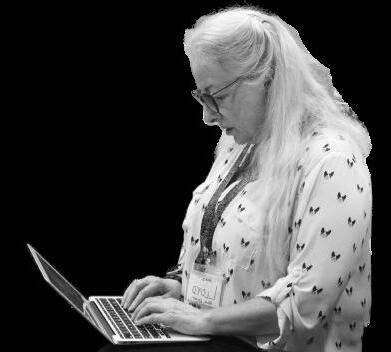

Q: Why are you choosing to retire?
A: I just want to retire, relax and enjoy
my golden years. I’m looking forward to spending time with my husband and my dogs, while having time to bake and garden. Also, I love genealogy, so I’m going to open up a genealogy company and be a consultant.
Q: What have you learned from teaching at HHS?
A: What I’ve learned the most is this concept of not freaking out. I always have a panic [for every drama production]. I say, ‘We only have this many weeks left, the sets are not going to be ready, or they’re not going to know their lines,’ but they always do, and [the sets] always [are ready]. I’ve learned that it does work, it does happen [and] it’s never not happened. I just need to chill and take a breath. The show always goes on.
Q: What are your visions for the future of the drama department?
A: I would love to see somebody come in and take over and be enthusiastic. It has to be somebody [who] appreciates theater and drama. [They also should] know how to do it — build sets, pick the right shows and direct. It’s a big job, and it’s a lot of work.
Q: What do you enjoy the most about teaching?
A: What I appreciate the most is understanding the impact my classes have had on people, especially my drama classes. Just giving these kids a voice and a place to express themselves and to [be] a part of something is incredible. Having given my kids that experience is my greatest joy.
get too old. I also plan on remodeling my older house, raising chickens, working in a garden and enjoying my time.
Q: What has your experience at HHS been like?
Q: What are you looking forward to in your retirement?
A: Being able to do ceramics all the time [is my favorite part of teaching at HHS], so I’m ready to do my own art again before I
A: Overall, wonderful. Having multiple family members come through the ceramics program has been very enjoyable, and [it’s
been amazing] getting to know great students.
Q: What will you miss about HHS?
A: I will miss being around youth, and [being] able to do ceramics all the time.
Q: What will you not miss about HHS?
A: Students who are on devices or not interested, and having to police the restrooms.
Q: What have you learned from teaching at HHS?
A: [I’ve learned] that every student sees and understands things differently.
Q: Parting words?
A: Goodbye, high school is a small part of your life as you grow up.
Steve Lavelle looks back on his 19 years as an English teacher at HHS.
Q: Favorite HHS memory?
A: [I’ve loved] having fun with the kids over the years while learning together. One day a few years back, one of my students fell asleep during a film I was showing toward the end of year. I had the kids quietly gather their things and exit the classroom with me. We waited in the hall for a minute until the bell rang to see what would happen. The kid woke up startled to see the room was dark and empty. He grabbed his backpack and ran out the door, and we all gave him a friendly round of applause.
Q; Why are you choosing to retire?
A: I’m retiring because I had a heart incident last year where I had a cardiac arrest and virtually died here in my classroom, but
was saved by my heroic students and staff. I’m so glad to be alive, but I find that everything seems to be a little harder to do now. It is about my retirement age anyways, so I was going to retire even before my cardiac arrest.
Q: What have you learned from teaching at HHS?
A: I’ve learned that people who possess healthy levels of resilience, tolerance, compassion and a dash of positive attitude will have a successful and fulfilling life, no matter what awaits them.
Q: What will you not miss about teaching at HHS?
A: I will not miss early starts, Mr. Unsinger and Mr. Lee. I will not miss this crazy new schedule we have, and I will not miss the traffic of the staff parking lot. And if I
Working in the English department for 12 years, Debbie Vanni looks back.
Q: Why are you choosing to retire?

A: The first time I started thinking about retirement was during the pandemic because it was pretty rough. I had some physical issues, and I thought it was time. Life has some interesting things that happen that you can’t control. I decided maybe I needed to retire this year and not put it off. It wasn’t anything I was planning when I first walked on campus this year.
Q: What have you learned from teaching at HHS?
A: There [are] a few things that really make a good teacher and make people want to stay teaching. [A big part of it] is the kids – if you don’t like kids, there’s no point at all. I don’t care how good you are at your subject — it doesn’t matter. You must be engaged with kids [and] interact with them. Each day is different and exciting [when it comes to] creating dynamics in a room.
don’t ever see another essay, that would be a blessing.
Q: Parting words?
A: Pick up a book and read. It helps you become a better reader, writer, speaker and thinker. What more can you ask for?
[The second part] includes the collaboration with your peers. I can’t imagine working another job where you have access to professionals who have degrees in all these subjects. If I have a question about something I don’t understand in science, I have access to all these great minds. I love that I have so much knowledge around me, and I can shoulder tap people.
And, the third thing is how much you love your subject matter. I love my subject matter a ton, and I will never stop loving it. I love English, reading, talking about literature, writing, and reading other people’s writing. I do feel that passion [for teaching it].
Q: What’s your favorite memory?
A: One of my more fond memories would be having the honor of giving the graduation speech. I was shocked when they asked me. It was such a treat to write something original for that particular group. I really thought about that group and how I could send them off in a meaningful way.
Q: How have students impacted you?
A: I generally don’t forget students. But
there have been people who have touched me, and I’ll never forget [them]. There are students [who have] written something, and I thought, ‘Wow, you have such great insight.’ I remember pulling a student aside three or four years ago, and I said, ‘What are you going to major in in college?’ She said ‘biology’ and I said, ‘Are you sure you don’t want to be a writer? Because you’re really good.’ And then there [are] others — maybe their skill level isn’t quite there yet — but they have the passion, and I love that too. I was not the greatest English student in high school. I became a much better student in college. It takes time to grow, and so I love the kids that are passionate about the written word.
Q: Parting words?
A: I’m going to miss it. This is a tough place to leave because I went to school here a very long time ago. Almost all my family went here, and one of my cousins said, ‘when will the last Vanni leave HHS?’ This has been my life — this is the heart of my growing up, and I forged a lot of friendships here, not only when I was a student, but also as a teacher.
COLUMN — With prom rapidly approaching, the hunt for dresses is already underway.
Last year, I waited until the last minute to find a dress for junior prom. I scoured Great Mall in Milpitas in hopes of finding the perfect dress, but the racks in Windsor had already been emptied, with the leftover dresses flung on the floor. As I wandered around the mall, I found a large dress shop I had never heard of, Camille La Vie. However my last shred of hope quickly dis appeared when I spotted a price tag, appalled at the idea of spending over $300 on a dress I would wear once in my life.
I left the store that day.
The weekend before prom, I became increasingly desperate and went to Valley Fair, willing to settle for any acceptable dress. I ended up in Nordstrom after a few hours of sifting through shops, and just as I was about to give up, I found a royal blue satin dress hanging on a rack all alone. To my relief, it fit perfectly, and I went home with my prom dress.
This year, I swore to avoid this debacle and found the perfect red dress for senior prom in March.
Finding the right dress for prom is no easy feat. So, here are some of my top recommendations for places to shop, which will hopefully spare you from the wild goose chase I went on.
Windsor is always an affordable classic. You should not waste time going to the store, but instead shop online, where you can find their whole collection. However, if you are looking for a one-of-a-kind dress, Windsor is not the move. I can almost guarantee you will find yourself twinning with at least one other person.
Oh Polly has some affordable options, specializing in satin, silky dresses that can be found in all different lengths. But if you are looking for more of a ball gown, this is not the place for you, as they mainly sell fitted pieces.
For Love & Lemons has elegant and non-traditional options if you are willing to spend some extra money, as dresses range from $200-$400. They offer many different cuts, as well as a selection of printed designs. As prom season rolls around, I hope these recommendations help you find the perfect dress!
From a sprawling bathhouse to a tranquil sea railway, the visuals of Hayao Miyazaki’s Academy Award-winning masterpiece “Spirited Away” depict an exquisite world. With an ethereal soundtrack featuring songs like “One Summer’s Day,” the film captivates audiences around the world, utilizing animation as a powerful medium.
In 2001, the addition of the Animated Feature Film category to the Oscars signaled a promising trend: a greater appreciation for animated films. Yet, despite the powerful visuals that animation instills within the minds of viewers, members of the film industry often ignore the value of animated films.
Animated films struggle to re-
ceive nominations and awards in other categories, which are dominated by live-action films. This year, besides the categories dedicated to animated films, none earned additional nominations, according to the Oscars website.
The lack of recognition for animated films at the Oscars undermines the masterful work and imagination of animators who spend thousands of hours drawing thousands of intricate frames. This makes it difficult for film directors to take this medium to the next level and compete with the giants of live action films.
In reality, animated films are just as or even more transformative and deserving compared to live-action movies. Animation is a medium for film, conveying a unique form of storytelling to the audience and celebrating art.
A perfect example of this is the animated film “Flee,” which depicts the real-life struggles of Amin Nawab, a gay man, in an easily
consumable method of storytelling with a collage style that brings life to his past memories. Even now, both kids and adults struggle to come to terms with their sexuality due to a lack of acceptance from parents and discrimination.
Furthermore, unlike live-action movies, animated films have no limitations as to what their stories can depict.
Stating animation is merely a genre and “just for kids” direspects animated films, as the unique storyline of each film and the process of animation requires a wide variety of skills, ranging from handdrawn frames to computer-generated imagery, making the world of animation a powerful medium rather than a genre.
There remains an underappreciation for animation in the world of cinema that has persisted for too long. It is time for movie enthusiasts, film critics and award shows alike to recognize animation as a legitimate medium for storytelling.
Animatedfilmslike“Flee”tellpowerfulreal-lifestoriesthroughuniqueanimationstyles.(PhotofromNeon)


The Mandalorian returned to his namesake show on March 1 with a new quest to undertake: redeeming himself to become a Mandalorian once more. Although his venture to Mandalore and his capture by Moff Gideon are just two of the many thrilling moments within the season, there are certain points in the plot that damage the overall quality of the show.
The first three episodes are among my favorites, because the Mandalorian places himself in danger in hopes of gaining redemption. Additionally, the first few episodes reintroduced characters such as Bo-Katan and Greef Karga, creating a stronger link between this season and the previous ones.
Nevertheless, one key detail confused me during the very first episode. After the heart-
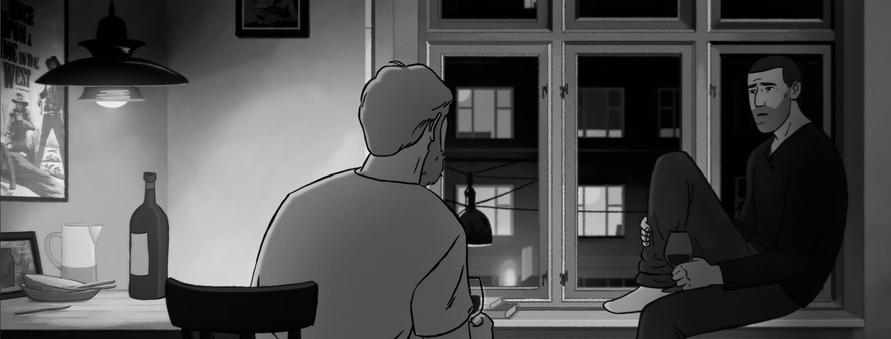
felt ending of season two, Luke Skywalker took Grogu, known to many fans as “Baby Yoda,” to train him in the ways of the Force. Although it was explained in “The Book of Boba Fett,” I did not understand how Grogu had returned to the Mandalorian and I expected the directors to clarify the context of these events in some way.
Other, smaller stories take place throughout the season. We see the story of Dr. Pershing, the lead scientist on the ship of Imperial Leader Moff Gideon. Dr. Pershing attempts to pursue a path helpful to society by becoming part of the New Republic Amnesty Program.
This story could have been interesting, as Dr. Pershing brought up the concept of salvaging Imperial technology to help the New Republic. However, it seems to have been cut short, since Dr. Pershing loses his memory, an
event that diminishes the story.
Bo-Katan’s endeavor of uniting two large Mandalorian tribes is a great addition, and to increase the excitement, Moff Gideon returns in an attempt to persecute the Mandalorians. I thought the return of an old villain would be a big flop, with experiences like “Star Wars: The Rise of Skywalker’’ contributing to that feeling. Contrary to my expectations, I found myself enthralled by a sudden turn of events: the unanticipated capture of Din Djarin.
Even hours after seeing the Mandalorian lose to Moff Gideon, I was unable to digest what had happened. Unfortunately, seeing Din Djarin’s effortless escape in the next episode made his initial capture feel unnecessary.
Disney has the tendency to make the Mandalorian seem tough and almost invincible, which
Lana Del Rey: cherry cola, haunting melodies and the timeless sounds from years past. Across nine records in 12 years, Del Rey’s style has become one of subtle yet potent storytelling, creating a stunning blend of elegant vulnerability laced with heartache. With her most recent record, “Did You Know That There’s a Tunnel Under Ocean Blvd,” the singer-songwriter reveals a side of herself never seen before.
At times unsettling, at times enthralling, the album embraces themes of family, faith and fidelity. Stripped of all of Del Rey’s personas, this record is raw and unfiltered, chronicling each stage of the singer’s life — past, present and future. It cycles through
the wistfulness of youth, the complexities of an illicit lover and the melancholy of motherhood, featuring a wide range of highlights and lowlights.
Although the record features Del Rey’s distinctly eclectic sound, “Did You Know That There’s a Tunnel Under Ocean Blvd” is a pivot in the wrong direction from Del Rey’s previous works.
In the title track, Del Rey paints a portrait of grief against a backdrop of the West Coast. Yet, for a song intended to set the tone of the album, “Ocean Blvd” does anything but that, with repetitive lyrics and a bland melody tainting the beginning of the record.
In between tracks, Del Rey includes snippets of her daily life.
“Judah Smith Interlude’’ features a four-minute sermon over a piano melody, a confusing and bizarre
addition that feels incredibly out of place.
In the nonsensical, unremarkable “Peppers,” Del Rey traces the descent from purity to promiscuity. In this graphic jumble of a track, Del Rey demonstrates that her identity as a performer is two-dimensional, attempting to appear sophisticated, but coming off as shallow instead.
Yet, on an album mostly lacking in structure and character, “Fingertips” stands out. In this vaporous ballad, Lana mourns the burdens of her past and the simplicity of girlhood. This track explores the unguarded edges of Del Rey’s life in a way that is absent in her other songs. The album closes on a weak note with “Taco Truck X VB,” which includes a sample of Del Rey’s song from a prior album.

With the song, Lana delivers a lifeless imitation of her prior works, circling back to the years of her faded prime.
While some commend the chaos of the album, it is for the most part an aimless, uncompromising mess. Although Del Rey deserves praise for her disarming honesty, “Did You Know That There’s a Tunnel Under Ocean Blvd” is nothing more than an echo of her previous albums, desperately clinging to the successes of her past and still falling short.
slightly vexes me. Despite this, the climax made sense, and the events afterward did a decent job of tying up most remaining loose ends, leaving me content.
Din Djarin’s transformation from a hardcore bounty hunter to a loving father helped the show secure its spot as a key part of the “Star Wars” storyline. This new season, for the most part, lives up to its excellent reputation. Although I was mildly disappointed with Grogu’s unexplained return and the slow progression of the story, the surprisingly satisfactory ending saved the show, almost making up for the first few lackluster episodes and allowing the reputation of “The Mandalorian” to remain virtually unscathed.
“The Mandalorian” Season 3. Grade: A-. Rated TV-14. Watch on Disney+.
“Did You Know That There’s a Tunnel Under Ocean Blvd”. Artist: Lana Del Rey. Grade: C+.
Furniture giant IKEA offers more than just stylish bookshelves and practical storage solutions. The store’s restaurant has become a cult favorite among shoppers and foodies alike, offering affordable and convenient meals after a day of wandering through aisles of furniture.
From classic Swedish meatballs to almond cake, IKEA’s restaurant menu is a must-try for anyone who sets foot in the store. As a frequent shopper, I was curious to review the food at this unique dining place and share my thoughts.
The fries were immediately a standout item. They had a good crunch and were not too salty, with just the right portion size. The price of $1.99 for a plate of fries was also reasonable.
In addition, the green medallion, a potato-based dish with broccoli, leek, onions and cheese, also impressed me with its healthy yet flavorful blend, earning a high score of 9/10. However, this dish was not quite worth $3.49 be-
cause of its really tiny portion size. I would definitely recommend the side dishes as a snack after shopping.
Next, I tried their famous Swedish meatballs ($9.99), which were tender and slightly salty, but the lack of cranberry sauce was extremely disappointing. This sauce is the signature aspect of the dish, and without it, the entire meal fell short of my high expectations. The side of potatoes that accompanied the meatballs was bland, earning a lackluster score of 6/10, and the accompanying sauce did not fare much better.
The mac and cheese ($1.99) was the least appetizing, with a pasty texture and an uninspiring taste, but considering the price, this was not a huge surprise.
I was, however, surprised to discover that they offered salmon. Overall, the dish had immense potential, featuring a delectable sweet and sour sauce. However, the fish itself was too tough and bland, and the cold peas served on the side were a turn-off. It was definitely not deserving of the overwhelming cost of $12.99. The garlic bread was also disappointing, as there was not enough garlic or crunch, and it was served cold, ruining any chance it had to impress.
Desserts were a hit or miss. The
TikTok, the social media app beloved by millions of users, risks a nationwide ban in the United States, according to Time Magazine. Calls for a TikTok ban are primarily led by Republican lawmakers in Congress, due to numerous allegations that ByteDance, TikTok’s parent company, is collecting data and spying on users.
Supporters of this ban claim TikTok poses a threat to national security and user privacy, according to AP News.
A limited ban restricting the use of TikTok on most government-issued devices already took effect on August 6, 2020 and seems reasonable. However, extending this ban to everyday civilians in the United States is excessive and would affect millions of users.
Despite all of TikTok’s shortcomings and possible dangers, this app serves not only as a method of communication for users, but as a prime source of entertainment for millions of people across the country. Additionally, many small businesses also utilize TikTok to advertise and drive traffic to their stores, according to Business Wire.
However, the amount of data TikTok extracts is still concerning and infringes on people’s privacy. For example, research conducted on the app revealed that TikTok installs browser trackers, enabling it to track a user’s internet activity
should not be fully banned, there need to be more regulations on this app for it to remain. Back during the Trump administration, one proposed solution to this issue was for ByteDance to sell all of its stake in the app to an American company, which was supported by the Committee on Foreign Investments in the United States, according to The New York Times.
In the end, a settlement making ByteDance sell part of TikTok to both Oracle and Walmart fell apart. Although this resolution would have solved many of the security concerns among Americans, it is unfair for ByteDance, because the company would not gain any benefit from it.
Currently, a new draft agreement with the Biden administration has been proposed, but is still under review, according to The New York Times. The agreement highlights several new guidelines TikTok must follow.

First, the app must only store American data in servers that are based in the United States and potentially run by Oracle. Second, TikTok will be expected to keep an eye on the algorithm that feeds users’ content to ensure posts with the potential to influence the American public, such as propaganda, are not promoted. Third, a board of security experts will be formed and report to the U.S. government about their operations in the country. This agreement is significantly better than the previous one, as it is a lot more fair and mostly addresses the concerns with the app. Ultimately, I do not believe Congress should ban TikTok in the United States for the sake of the average American. Despite receiving a lot of bad press lately, TikTok still has many positive impacts on our society, such as allowing more people to network with each other and helping local businesses grow. However lawmakers must enforce stricter regulations on the app to ensure all users are protected.
DAIM almond cake is a time-honored tradition of IKEA shoppers, and it became one of my favorite IKEA dishes for its crunchy almonds and not overly sweet taste. However, given the price of $5.69, customers are much better off buying their frozen option with the entire cake and eating it at home. While the almond cake was hard to top, I was excited to try blueberry cake with lemon ricotta, which turned out to have the most pungent chemical taste and artificial blueberry flavor. At no price would I ever eat that cake again, and as the last dish I ate, it ruined my entire appetite.
To top it off, the service at the IKEA restaurant was terrible, contributing to the overall underwhelming experience. While some dishes dazzled, the lack of consistency and quality across the menu left much to be desired.



As a consistent shopper at IKEA, sometimes, after browsing through three floors of furniture, I need some food to satisfy my hunger. Despite the subpar dining ex-
perience, the restaurant’s convenience cannot be denied. And, let’s not forget about the affordability of the food, which makes it an attractive option for many shoppers. So, while the food at IKEA is far from exceptional, it continues to serve its purpose as a convenient option for those who need to refuel after a long day of furniture shopping.
When country singer Kelsea Ballerini took the CMT Music Awards stage on April 11 with drag queens to sing “If You Go Down (I’m Goin’ Down Too),” she sent our nation a clear message: drag queens deserve a space to express themselves.

After Tennessee passed new legislation banning drag queens in public spaces, Ballerini took a liberal stance in a genre that is popular among conservatives and shocked audiences, according to the LA Times. Ultimately, Ballerini’s performance demonstrates a need for more country stars to speak about social issues, even if they risk their platform by doing so.
Country music has long been associated with conservatism, especially after The Chicks lost their following by speaking out against former President George W. Bush in 2003, according to Billboard. However, through Ballerini’s performance and the inclusion of openly gay artists like Lil Nas X in country music, it is clear that the genre is evolving to allow artists to use their platforms to voice their opinions on impactful issues.
Morecountryartistsshouldspeak aboutsocialmatters.(PhotoillustrationbyNiyateeJain)
Ballerini is not the only artist to confront Tennessee’s controversial legislation. Earlier this March, at Nashville’s Love Rising event, which benefits Tennessee organizations that support LGBTQ+ causes, country singer Maren Morris told the audience she introduced
her young son to drag queens and told Tennessee to “f------ arrest her.”
Like Ballerini’s performance, Morris’s allyship is crucial because she had the courage to take a public stance on an issue that may not align with the majority of her audience’s beliefs.
Furthermore, what differentiates Ballerini and Morris’ stances from other controversial opinions is they are spreading positivity and promoting a message of inclusivity. While some people believe other artists should be more open with their beliefs, artists with stances that discourage people from expressing themselves in public, like those who support the Tennessee ban, should not be allowed to use their platform to circulate hate. With more and more states doubling down on the LGBTQ+ community’s rights, country stars should take the opportunity to speak up for the social issues that matter. And, as country music continues to evolve, we can only hope this trend sparks a necessary change in conservatives’ harmful and discriminatory perspectives on the LGBTQ+ community.
My mother often talks to me about random celebrities she discovers. First, it was Lisa from a K-pop group, BLACKPINK. Then, it was Jackson Wang, a former member of another K-pop group, GOT7. But recently, MILLI caught her attention.
What sets MILLI apart from the other two artists is her heritage and talent. Danupha Khanatheerakul, or MILLI, is a 20-year-old Thai rapper. She performed at Coachella in 2022, becoming the first Thai solo artist to do so. I greatly admire her because I was born to a Thai mother, but I did not spend a lot of time with my culture during my childhood in the United States.
However, with MILLI emerging in the music scene, I am happy to be gaining some exposure to my heritage through her music. Ultimately, MILLI provides a way for me to experience Thai culture, alongside many other Thai teenagers who also interact with her work through daily conversations about her music and on social media. Furthermore, I am proud to have
found an opportunity to connect with my Thai roots in an impactful yet unique way. Instead of exploring my heritage by riding elephants or visiting temples, which is how many people seem to perceive Thai culture, I am accomplishing this through MILLI, which makes my journey toward embracing my heritage feel more personal.
With her unconventional “I don’t care” attitude, MILLI uses her platform to communicate important messages through her music. In her song, “SUDPANG!” she shows a woman’s beauty is not de fined by her style or ethnicity.
Moreover, she explores themes of consent with a retro track called “Not Yet!” The song teaches an important lesson but is executed lightheartedly with the translated, repeating line, “I don’t wanna have se-se-sex” and a male voice sug gesting something more.
Overall, MILLI’s youthful voice and playful personality serve as a reminder that life is not always so serious. Her most impactful song is her remix of BIBI’s “The Weekend.”
BIBI’s original version is somewhat gloomy, although still enjoyable. But in MILLI’s upbeat rendition, I can imagine myself dancing through a dark street only lit by one lamppost as I sing along.
Similar to how MILLI transformed BIBI’s song into a more joyful one, MILLI has the power to change my attitude and brighten my day. Although MILLI is still developing her career, I am confident her name will gain attention globally — perhaps even more than BLACKPINK’s Lisa

Injuries in sports are common, and baseball is no exception to that norm. Nevertheless, the frosh-soph team has pushed forward despite challenges with hurt players, pitcher, catcher and outfielder, Mason Di Leo said.
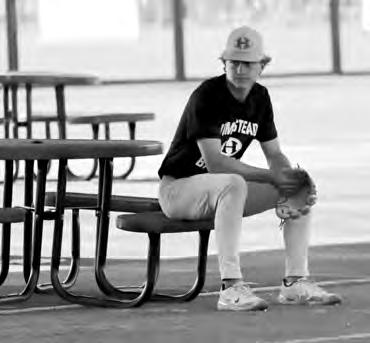
Di Leo, a sophomore, tore his ACL during a game against Archbishop Riordan, and will be out for the duration of this and next season. However, he said he hopes to return for his senior year.
“During the moment, I felt like I let my team down,” Di Leo said. “The next couple of games after
that, there wasn’t as much energy, but the team had to pick it up and figure it out.”
This is not the first time the team had to work around an injury. Both freshman players, outfielder Will Hamburger and catcher and midfielder Drew Hamburger have struggled with injuries in the past and were forced to take time off from baseball.
During one of his games, Will overstrained an oblique in his back, and Drew injured his arm from overuse.
“I’ve tried acupuncture, cupping [and going to] a chiropractor, but really the main thing that will help is just time,” Drew said.
“When I’m finally healthy, I’ll have to go through physical therapy to build the muscles back.”
One method to minimize both minor and serious injuries is recognizing the importance of warm up routines during practice, frosh-soph coach Curtis Currier said. This helps avoid some of the stresses the body has to handle throughout the course of practices and games.
“I think it has a lot to do with discipline, which we’ve talked a lot about this year,” Currier said. “It’s important to be disciplined with stretches and warmups so that when we get into game-speed repetitions, their body is going to
After doing club gymnastics for over 10 years, sophomore Saydee Blandini said she quit the sport at the start of the pandemic. This year, she joined the HHS gymnastics team, hoping to return to competition form after a threeyear hiatus.
Having competed in both club and school gymnastics, Blandini said there are differences between the two. The HHS team practices in CHS’s gym, which has less equipment than typical club gyms. As a result, Blandini said she often trains at the gym where she works as a side job, which has superior facilities.

Although she does not regularly train at CHS, she attends practices once a week to spend time with her teammates, who help make school gymnastics more relaxed than the club sport, Blandini said.
“There’s a lot less pressure, so you’re able to breathe,” Blandini said. “It’s also less competitive
because it doesn’t matter as much, since it’s just at school with your friends, and not a state title.”
In addition, freshman Alexandra Craciun said the team’s coach, Garry de Guzman, is responsible for the less stressful atmosphere. While club teams push gymnasts to build up the reputation of the club, school gymnastics focuses more on developing skills and bonds, Craciun said.
“Our coach is really sweet and good at teaching,” Craciun said.
“The facilities [at CHS] aren’t the best, but he’s definitely doing the best to help and support us.”
A former member of the school team, junior Saanika Patel said she participated in recreational club gymnastics for around five years before joining the team as a sophomore. For Patel, one of the key differences between the school team and club gymnastics is the rigid structure and larger
time commitment required for the club sport.
On the other hand, Patel said gymnastics at HHS is more flexible, allowing gymnasts to choose their events and create their own routines. The program also allows gymnasts like Blandini to practice individually while still competing at meets. Craciun said these unique features of the school team have brought the gymnasts closer together.
“We always cheer for each other when we’re competing,” Craciun said. “During practices, we’re always talking and being friendly with each other. Even if we’re not competing together, we’re still there for each other.”
Louisiana State University won the NCAA women’s basketball championship game against the Iowa Hawkeyes on April 2, marking the team’s first-ever national championship. However, all that seemed to make the headlines was LSU forward Angel Reese’s taunt toward Iowa guard Caitlin Clark, according to NPR.
With the game in its final minute and LSU up by 16, Reese taunted Clark with the “you can’t see me” taunt, resembling the same gesture Clark had done against Louisville in the Elite Eight game a week prior. Twitter users and media members alike quickly headed to social media to criticize Reese, a Black woman, spreading ideas that her celebration was somehow in bad taste. Yet, when Clark, a white woman, did the same gesture, the response was much more positive, celebrating her and her passion for the game, according to NPR. It is no surprise that when a Black woman shows
her emotion, she is labeled as “classless,” but when a white woman acts in the same manner, she is just “playing with heart,” according to various Twitter users.
Racial bias in sports media is very prevalent, with commentators and media outlets more likely to highlight lighter-skinned players for their mental abilities, and darker-skinned players for their physical characteristics, according to a study by Brookings Institution.
It is frustrating and plainly wrong when the “angry black woman” racial stereotype is used against an athlete who is just playing the sport she loves, especially when trash talk is a part of the game. For women’s
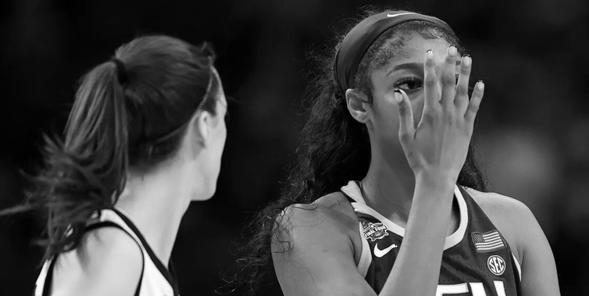
respond properly.”
Despite being injured, Di Leo said he still attends games to support the team and watches baseball instead of straining his body in order to heal.
“The worst part about being injured is sitting out and seeing everyone practice,” Will said. “No one wants to do that. That’s the struggle you have to deal with. Then, once the symptoms get better, you’ll be back in the game in no time.”
Theteamdealswithvariousinjuries,frosh-sophcoachCurtisCurriersaid,butusuallycopeswiththembylettinginjuredplayers takemorebreaks.(PhotobyMackieVu)
Swimmers share experiences playing water polo, competing in swimming
By Lia Klebanov with additional reporting by Karuna Chandran and Madhavi KarthikBeginning with a splash in the water, the similarities between water polo and swimming often lead athletes to pursue both sports. Sophomore Ethan Qian, an athlete on the varsity swim and junior varsity water polo teams, said he began playing water polo this year due to feeling burnt out from swimming and wanting to try something new.
“Swimming is essential for water polo just like how running is essential for football and soccer,” Qian said. “Swimming has definitely increased my speed, and is really helpful in water polo because you need to move across the pool really fast to help score goals.”
Senior Carmen Looney said she prefers swimming over water polo because of the low stakes swimming has to offer. When playing water polo, a team sport, Looney said she often feels a lot of pressure to do right by her teammates.
“I’m a very individual person so I like being able to do my own thing without having to feel like [everyone is counting on me],” Looney, who competes in both varsity water polo and swim said. “There’s a lot less insecurity with swimming since everyone supports each other no matter what
they do. Whereas with water polo, it’s very high stakes and teambased, so when someone doesn’t do something right, it’s very [high pressure].”
At the same time, Qian said water polo often causes him to forget his swimming skills, so he had to adjust once again for the spring season.
“Water polo has improved my explosiveness [in terms of] sprint in swimming, but water polo swimming is different from normal swimming,” Qian said. “Instead of swimming with your head down, you swim with your head up.”
Sophomore Julia Lohman said she joined junior varsity water polo after hearing many of her friends on the swim team trying it out. After joining, she said she discovered she had the necessary conditioning from swimming to succeed in water polo.
“[When I played water polo, I learned to] utilize my legs more,” Lohman said. “I was someone who swam primarily with my arms, but water polo taught me [that] a lot of power can come from your legs, so I’ve been focusing more on my kick and my push from flutter kicks.”
After extensive experience in both sports, Looney said she finds the different application of team dynamics to be one of the biggest differentiating factors.
“Water polo is a lot more aggressive [and] team based and there’s a ton of very physical practices,” Looney said. “Swimming has more of a carefree environment because you get to cheer on your friends for many different events so it is super supportive. It is super fun watching them do their best.”
sports in particular, the entertainment value that comes with players insulting their opponents is key for gaining more viewership, which is crucial to achieving equality in sports, according to the LA Times. The win was a culmination of hard work and dedication. Yet, rather than congratulating LSU and Reese, who was awarded the tournament’s Most Outstanding Player, the media chose to create a charged narrative about Reese, making their double standards abundantly clear. Angel Reese and LSU deserve better; they were torn down in a time when they should be praised and saluted for their hard-earned victory.
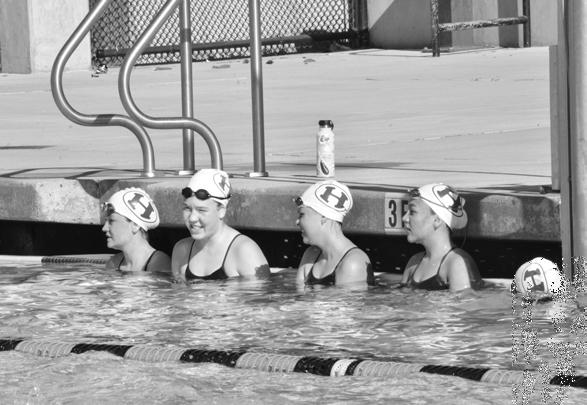
Reactions to Reese’s taunts expose racist double standards
“Winning my first game gave me confidence because last year, when I played doubles, I didn’t win very much. But this year, as a singles player, I’ve been winning more.”
“My favorite memory this season is when we won our Wilcox Tournament. It was a tough tournament because there were a lot of teams, but I think [the entire team] performed really well.”
-
“At one point [my doubles partner and I] were being pushed all the way back, but we made a good recovery shot and finished the point off. It was a [rewarding] moment because I was being held back, and then I overcame that.”

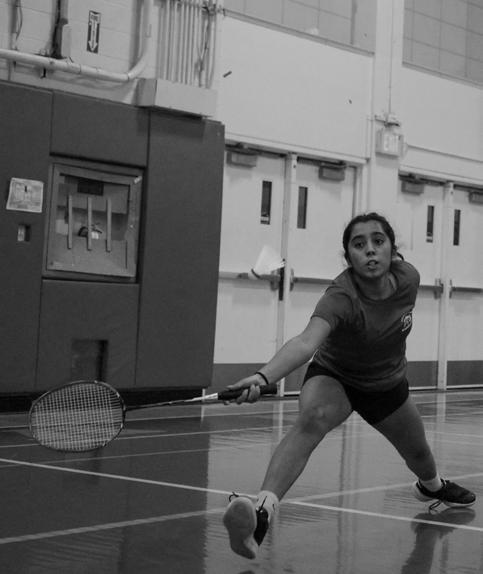
"Our win against Los Altos was a game that went into extra innings. We were all tired but we would say we tried a lot harder than the other team, which resulted in the win for us."
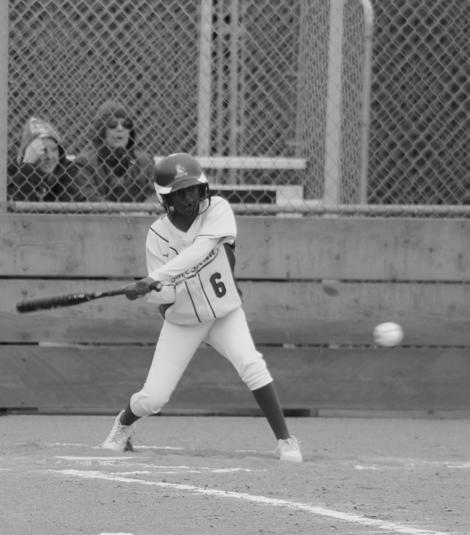
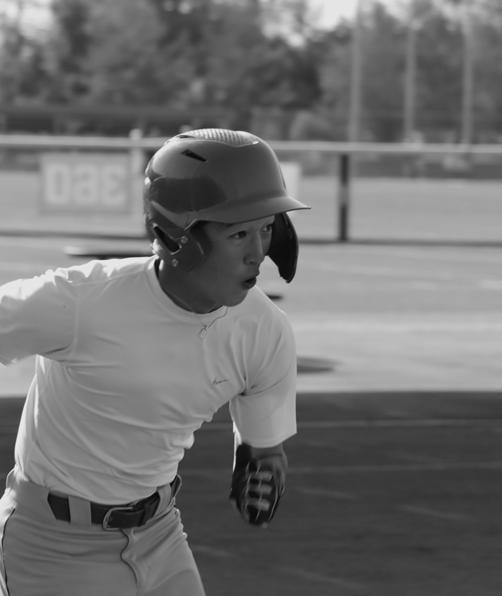
“Recently, I got an eagle on a par five, basically a hole in one. It felt pretty good because I won the match. It all came down to the last hole and I put it in, winning by one point.”



“I love anytime we’re super cheerful together. Laughing gets us in a bright mood and that makes playing more enjoyable.”
- Sana Ranganathan (11)
A strong work ethic is an integral part of any athlete’s mentality, but it is an especially prominent trait of swimmer, senior Kyle Huang. Nearing the end of his fourth year on the varsity team, his determination helped him persist through tough times, such as the pandemic, Huang said.

“Pools all over the world were shut down, which was really tough for me,” Huang said. “So I created a workout schedule that had me exercising two hours a day [to stay in shape]. I was one of the first on my team to get back to speed and into the pool because I was training so hard.”
Huang’s determination allows him to constantly improve his athletic abilities and leave a lasting impact on the team, varsity swim coach David Dour said.
“Kyle has been our best swimmer since freshman year and has only gotten better,” Dour said. “He is leaving some big shoes to fill and several school records — both individual and relays — behind him. He has been instrumental in helping us become a top program in the De Anza League and CCS.”
In addition to his athletic prowess, Huang is always open to constructive feedback and willing to do anything to improve his abilities to help the team, Dour said.
“Kyle has always been very
Jump is the best event. It’s really hard to score since everyone is so good, so you get that feeling that you actually accomplished something.”

"I’ve loved creating my own routines on each event and picking my own floor music."
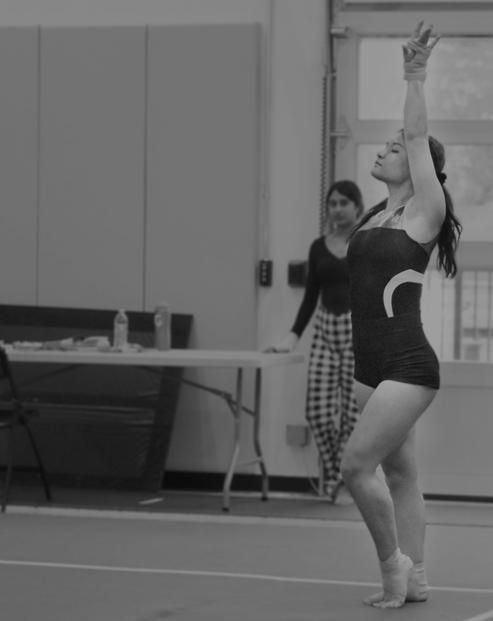
“The people are really friendly and the coach is really nice and even if you’re tired, he still motivates us to go on. Everyone seems super positive and [it’s just] good vibes. I realized [through my time with the team] that I really like doing long distance.”
- Chetana Maram (9)
VarSITY: Boys Girls
70-100 93.5-72.5



JV: Boys Girls
99-71 95-71




open to swimming any event I suggest in order to help the team win, depending on the situation and the opponent,” Dour said. “He is an excellent role model for future members of the HHS swim team, always willing to implement suggestions I have for his races and [always respectful] to everyone.”
Like his coach, Huang’s peers have deep respect and admiration for the senior. Huang’s ability to lead by example has inspired many other athletes and propelled the team toward success, teammate junior Owen Coblin said.
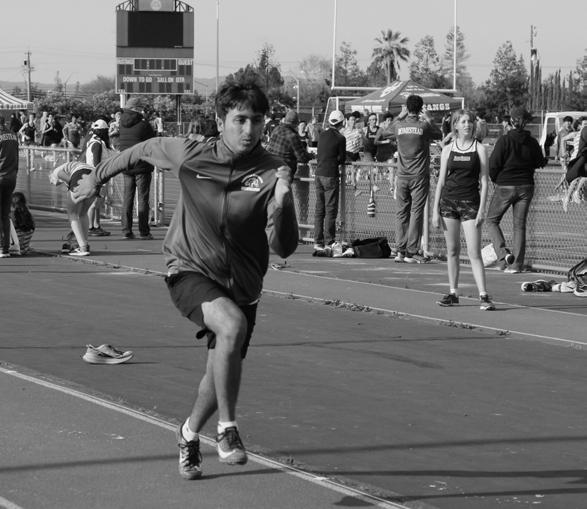
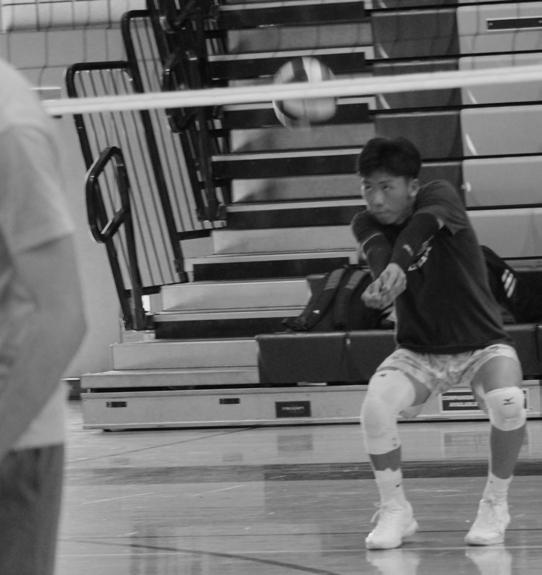
“Kyle is spectacular, both in and out of the water, and his leadership style is truly remarkable,”
Coblin said. “What makes Kyle stand out is his ability to lead by example — he sets a high stan dard for himself and consistently meets or exceeds it, inspiring oth ers to follow in the process. His work ethic, dedication and atten tion to detail are all evident in ev erything he does.”
Huang said he is grate ful for the life les sons swimming has taught him.
“Through swim, I’ve learned a lot, such as how to work hard but also work smart, accepting failure and learning from

it, encouraging teammates and giving them positive criticism,” Huang said. “I don’t think I would be day without
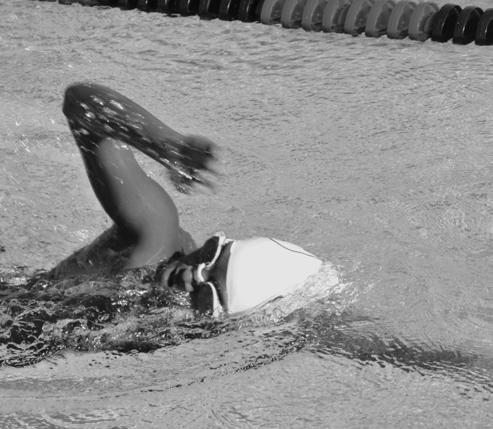

Studentsdiscusstheirpersonal makeupchoicesandhowit providesthemwithanopportunity forexpression.

because my skin tends to get oily very easily, and these brands’ products don’t make my face look too shiny.”
- Niara Phillips (9)“[With drag makeup], I get to experiment with how my face looks. I’ll look at myself and I’m like, ‘Wow, I’m literally an entirely different person.’”
 - Jesus Tamayo (9)
- Jesus Tamayo (9)
Guidance counselor

Eric Medeiros discussescollecting, maintaining wigs
“When I do my makeup and I think it comes out really pretty, I honestly don’t care what people think.”
- Angie Solorio (10)Likemanystudents,juniorNadija Mujkanovic has a careful and meticulous skincare routine. Mujkanovic shares her favoriteproducts.



“My favorite brand for skincare has to be The Ordinary, because they have so many different products for all skin types.”
“I use Supergoop sunscreen. It’s on the pricier side, but it’s amazing because it doesn’t have that oily residue that other sunscreens have.”
“Everyone should have a skincare routine. It’s great [for my mental health], and I love when my skin is clear, and I can see results.”
Wheredoyoubuyyourwigs?
“You can buy really expensive wigs that are very realistic but take a lot of maintenance, or you can buy cheap ones on Amazon.”
Howdoyoutakecareofwigs?
“Generally, I’ll wash the wig with shampoo and conditioner, then let it dry and comb it. You have to be really careful with the water temperature.”

Whatadvicedoyouhave forpeopleinterestedin wigs?

“If you’re thinking of wearing a wig, do it. I saw somebody wearing a wig, and I was inspired by the creativity and fun of it. I think they’re a really great way to express yourself.”
“I chose this design because it’s elegant yet simple, and the [green] color matched my “My set is very neutral, so [it goes] with everyday outfits and ties into the spring season.”
- Victoria Simpson (11)
“I usually get colors more than designs, but I always get the oval [shape] because
